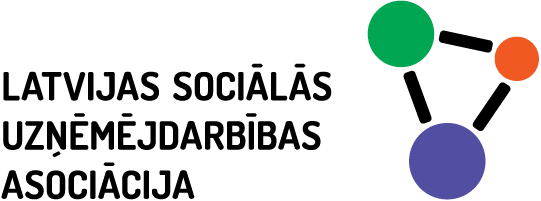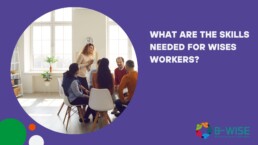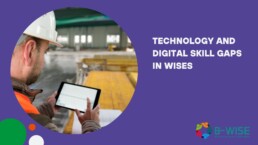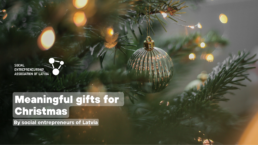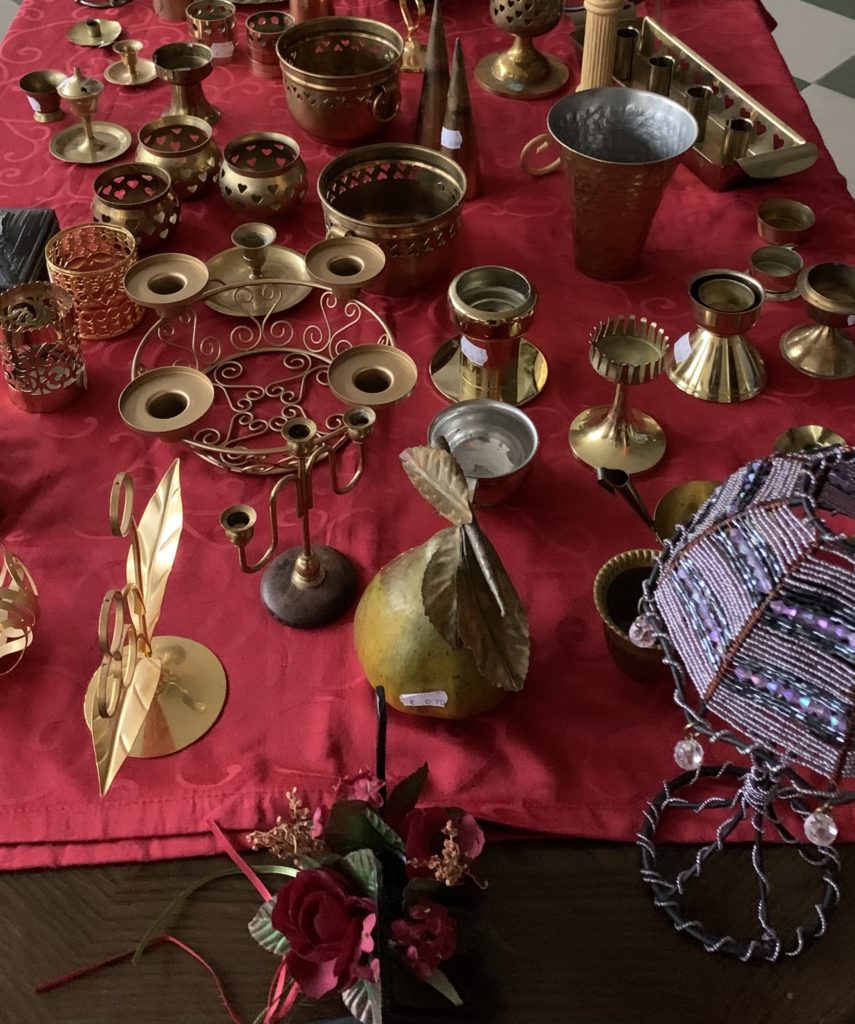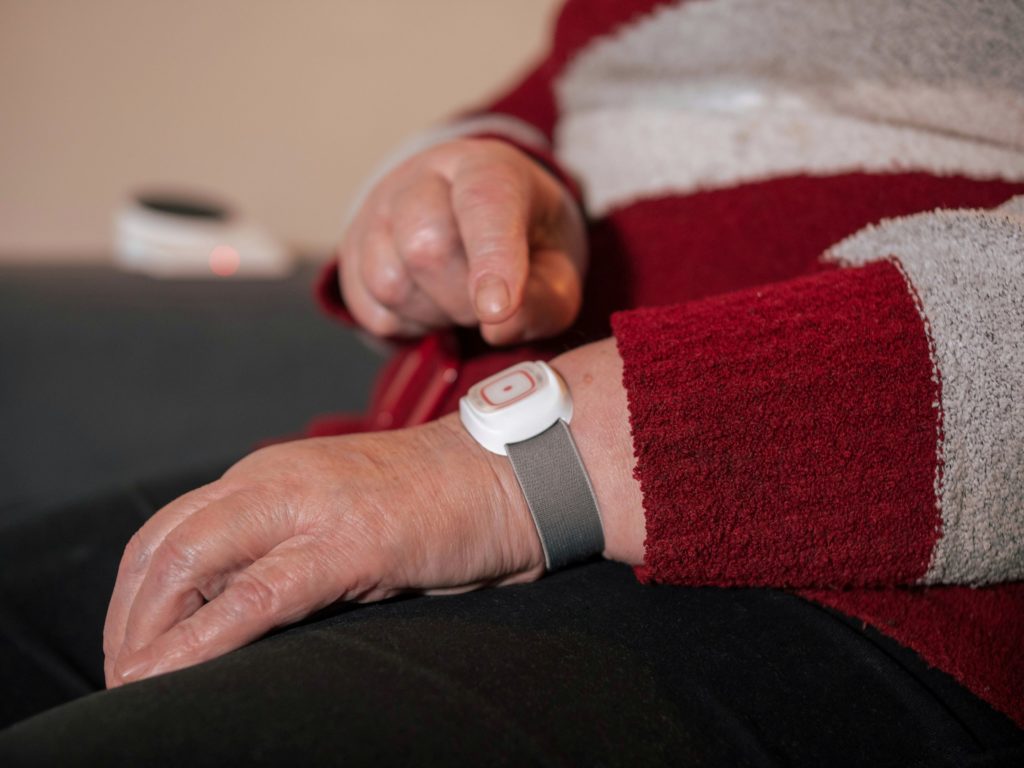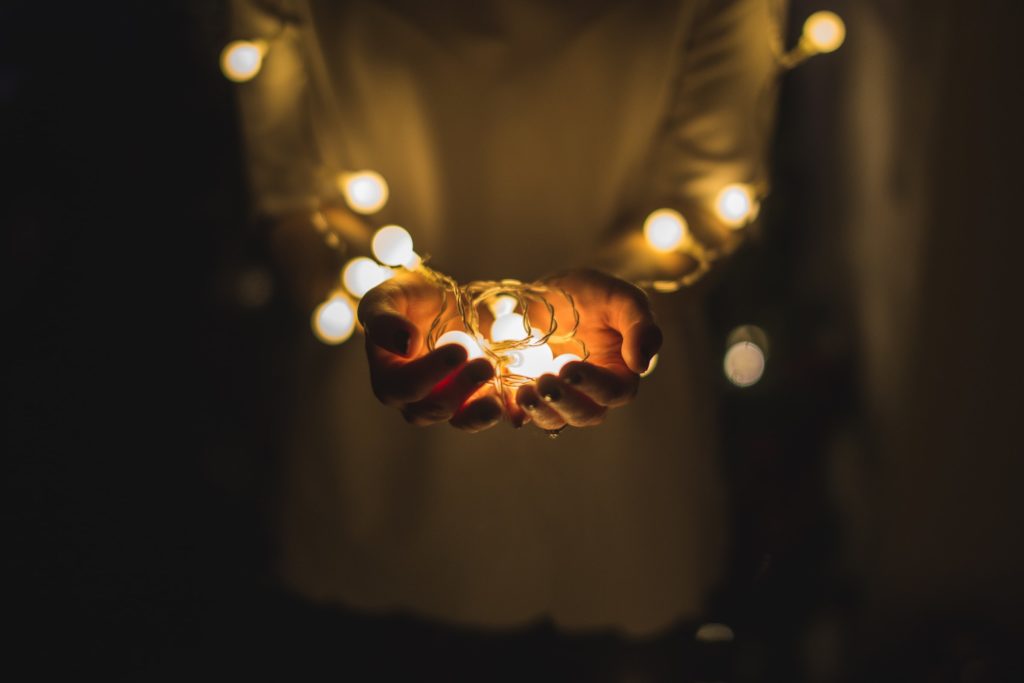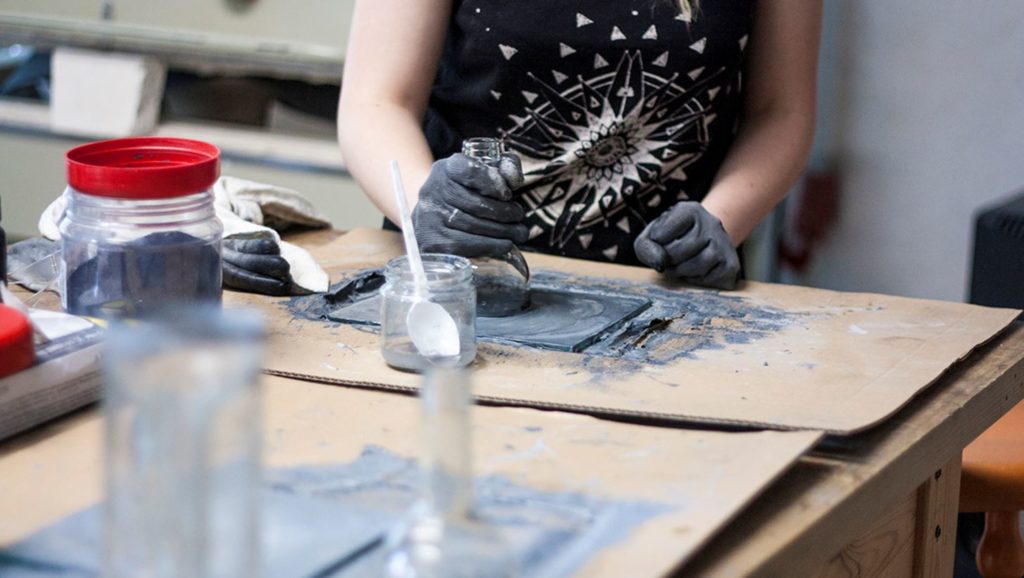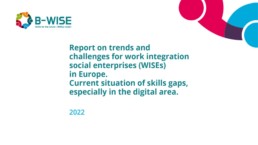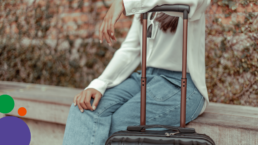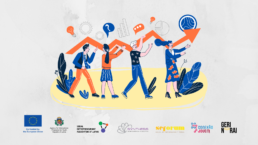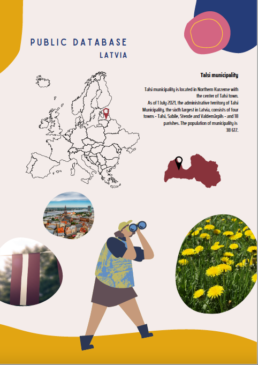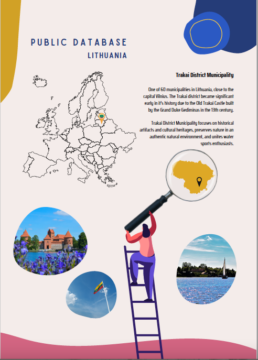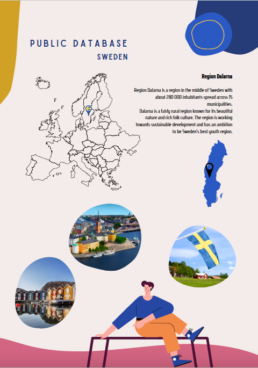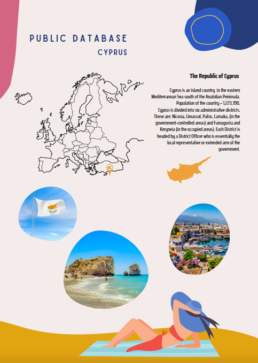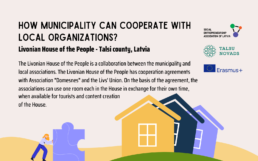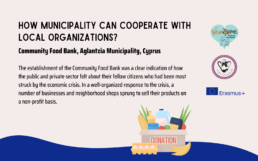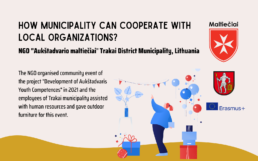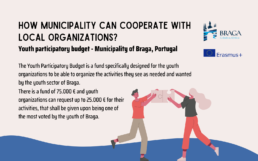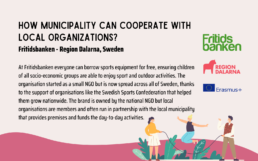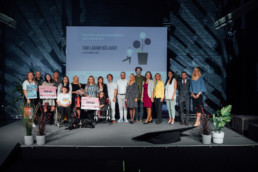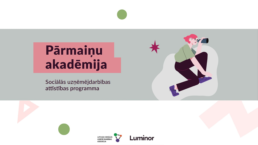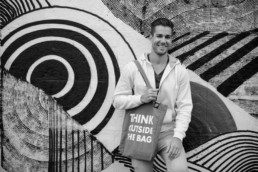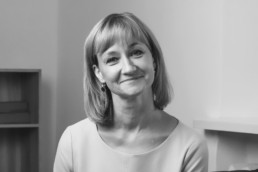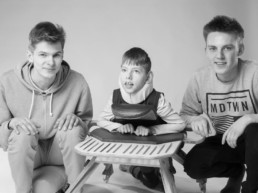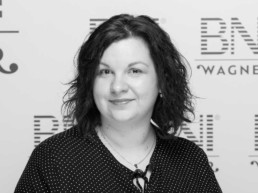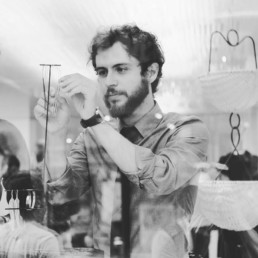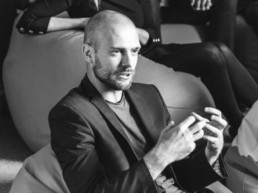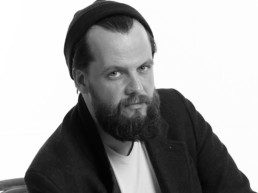What are the skills needed for work integration social enterprises' workers?
Various skills are needed for WISEs workers (enablers, managers and workers with support needs), here are the highlights of the report.
One of the research activities led in the framework of work package 1 was to map skills needs and gaps in WISEs across the 13 project partner countries. It was led in the form of an empirical analysis to map the skills needed to perform the jobs and fill the skills gaps in WISEs, with a view to profiling the training requirements of three main professional profiles, namely “enablers” (e.g., managers, area coordinators, IT specialists ); “supporters” (e.g., job coaches, tutors, and mentors) and and workers with support needs (WSNs)*. Face-to-face interviews were conducted with 403 persons (89 enablers, 145 supporters, and 169 WSNs) from a sample of around 100 WISEs in 13 countries across the EU. The investigation analyzed the available skills deemed as the most relevant for the above mentioned categories of workers and skills gaps. In addition, the reasons for such skills gaps, their effects on WISEs, and the strategies put in place to cope with them were examined.
The skills needs and skills gaps analysis highlighted four key findings.
First, the survey showcased that WISEs face specific challenges when compared to conventional companies. The level of skills endowment of all three respondent groups was rather good, with enablers and supporters particularly well aware of the broad set of skills needed to work in WISEs. The data analysis did not highlight any significant difference across countries, but it confirmed there is substantial room for improvement. Failing to fill skills gaps is regarded as particularly risky since it could jeopardize WISEs’ capacity to assist current and/or new WSNs and lead to an increased workload for staff. In other words, skills gaps could hinder the process of work integration.
Second, the various groups of respondents chose specific skills as particularly relevant. Enablers rated management skills as highly important: from designing strategies for the development of WISEs and making decisions to engaging in direct relations with employees to coordinate their activities and motivate them. Among other skills, negotiating with clients, especially private ones, was perceived as highly relevant. Supporters pointed out the multifaceted nature of work as they deal with a variety of activities, including planning work time and space, assisting and supporting WSNs in carrying out their tasks, and managing and reporting activities to their supervisors and coordinators. A mix of hard and soft skills is required, the balance of which also varies according to the specific role assumed by a supporter within an organization. However, what clearly emerged is that “assisting workers with support needs for their job” is crucial when looking at supporters. Interviews highlighted that counseling and mentoring activities, in some cases, aim to stimulate workers in their own growth at work: they favor a positive atmosphere and even touch on some personal aspects that impact work. Some interviewees felt that they have received all the necessary tools to manage the support and counseling of WSNs. There were cases in which a lack of training related to psychological aspects of the job, as well as the diverse typologies of workers’ disabilities, influenced the effectiveness of supporters’ activities. Finally, “collaborative, communicative and operational skills” were essential for WSNs to carry out day-to-day work activities with accuracy, precision, and autonomy. The importance of specific skills depended on the type of economic activity carried out, which in the sample interviewed ranged from manufacturing to administrative/office activities, catering, and waste management.
Third, when looking at enablers’ skills, the age of the organization makes a difference. Start-up WISEs need to build new skills to recruit the most suitable staff and develop effective working teams, while in more structured WISEs, the development of organizational and decision-making strategies comes to the fore.
Finally, from a comparative viewpoint, all three respondent groups considered specialized technical knowledge related to media and technology as not relevant; this can be traced back to the key role played by soft skills and other technical knowledge necessary to assist workers in carrying out their job tasks in WISEs.
Against the background of addressing skills gaps, respondents consider training activities particularly important. Based on their answers, training is primarily financed by WISEs’ own resources: most WISEs provide for training internally or support employees’ participation in external training.
Looking at the reasons behind skills gaps, enablers and supporters expressed similar opinions by identifying the shortage of economic resources as a very important factor and the lack of motivation as the least relevant reason. To tackle the scarcity of resources, one strategy is to support WISEs’ access to private funding schemes by encouraging their desire for collaboration via mutually supportive mechanisms.
An additional obstacle to filling skills gaps is the lack of time, which is typically a barrier in relation to training activities in small organizations. WISEs, especially when they are small in size, struggle to detach personnel from their required work activities. In these situations, training carried out within the organizations and combining both theoretical and practical activities can help WISEs overcome this problem.
Moreover, according to respondents, it is particularly difficult to identify the optimal training activities to improve supporters’ and WSNs’ abilities. Indeed, training activities may be stressful, especially for WSNs, when they are not fully tailored to address their specific skills gaps. Thus, it is important to invest time and energy in adapting training and education to the specific needs of recipients. Hence, individualized and targeted training designed and planned based on workers’ real needs and capabilities is crucial.
Finally, the findings of the survey underline the importance of further research on both the content and modalities of training., which will be done later in the B-WISE project.
Read the full report HERE.
The B-WISE project, Blueprint for Sectoral Cooperation on Skills in Work Integration Social Enterprises, is an Erasmus + project coordinated by EASPD with the support of ENSIE.
* E.g., people with physical and/or sensory disabilities; people with intellectual and/or learning disabilities; people with psycho-social disabilities and/or mental illness; people with substance use disorders; convicts and ex-convicts; people on long-term unemployment; homeless people; asylum seekers, refugees, and migrants; NEETs; female survivors of violence and members of ethnic minorities.
Technology and digital skills gaps in work integration social enterprises
This article focuses on technology, digitisation and digital skills of WISEs in the 13 B-WISE participating countries. It summarises the results of 403 face-to-face and 175 online surveys carried out between October and December 2021. For a more comprehensive report (English), please consult chapter 7 of the “Report on trends and challenges for work integration social enterprises (WISEs) in Europe. Current situation of skills gaps, especially in the digital area.“
Relevance of technology and digitisation for WISEs
Based on the surveys filled out by enablers (e.g., manager, area coordinators, and ICT specialists) we can state that:
- The digitisation of management processes (e.g. cloud computing services and e-invoicing) is the most significant domain in which WISEs apply technologies and digitisation processes.
- The second important domain is the digitisation of standardised production processes (e.g. ERP (Enterprise Resource Planning) software packages).
- In addition, the technological adaptation of individual workplaces is considered less relevant today and in the future.
- Artificial Intelligence (including big data and Internet of Things), rapid prototyping and assistive technologies are rarely used.
- Large WISEs reach in almost all cases a higher level of digitisation. As a consequence, scale will be an important factor for WISEs if they want to take further steps towards digitisation and towards the implementation of technologies.
Enablers: relevance of digital skills, needs and gaps
In the face-to-face survey targeting enablers, the relevance and the level of endowment of digital skills of the enablers in their WISE (their own digital skills and those of colleagues with a similar role) were questioned. Five competence areas were investigated in this survey: (i) management of digital content and data literacy; (ii) communication and collaboration through digital technologies; (iii) creation and editing of digital content; (iv) addressing safety issues in digital environments; and (v) solving digital problems. The survey shows following results:
- No significant discrepancies between the relevance of digital skills for enablers (upper table) and the level of endowment (lower table).
- According to enablers, all competence areas are relevant for enablers.
- This goes together with the level of endowment.
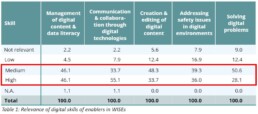
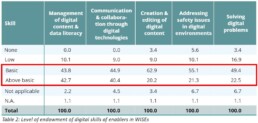
Supporters: relevance of digital skills, needs and gaps
To get a clear impression of the digital skills of supporters (e.g. job coaches, trainers), the survey for enablers included a judgement on the relevance and the level of endowment of the digital skills of the supporters in their WISE. The survey shows following results:
- According to enablers, following competence areas are most relevant for supporters:
- management of digital content and data literacy;
- communication and collaboration through digital technologies.
- According to enablers, 9.7% of supporters have no digital skills, 24.7% have a low level, 30.4% a basic level and 22% an above basic level of digital skills.
- For the two competence areas considered as most relevant for supporters, over 60% of supporters have a level of endowment that is basic or above basic (no significant discrepancies between relevance and level of endowment).
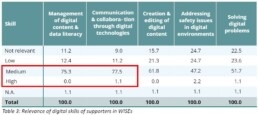
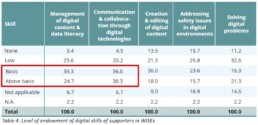
Moreover, the face-to-face survey addressed to supporters included a self-assessment, collecting information on the use of digital skills at work and at home. Supporters were asked if they performed a certain action (at work or at home) during the last three months. The self-assessment covered six categories: information skills, communication skills, problem-solving skills (A “Basic” and B “Advanced”), and software skills for content manipulation (A and B). Based on the survey results, we can state that:
- Supporters use and need digital skills both at work and at home.
- Although the use and importance of digital skills at work is high, supporters use more digital skills at home.
- Only basic and advanced software skills for content manipulation (e.g. word processing software, spreadsheet software or software to edit photos, videos or audio files) are more frequently applied at work.
Workers with support needs: relevance of digital skills, needs and gaps
To map the digital skills of workers with support needs, the survey addressed to supporters included a judgement on the relevance and the level of endowment of the digital skills of the supporters in their WISE. The survey shows following results:
- Overall, according to supporters, digital skills are not very relevant for workers with support needs at work.
- According to supporters, following competence areas are most relevant for workers with support needs:
- management of digital content and data literacy;
- communication and collaboration through digital technologies.
- According to supporters, 13.8% of workers with support needs have no digital skills, 28% a low level, 24.6% a basic level and 7.7% an above basic level of digital skills.
- According to supporters, there are no significant digital skills gaps among workers with support needs: relevance and level of endowment go hand in hand.
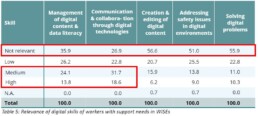
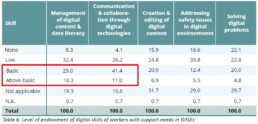
The face-to-face survey addressed to workers with support needs included the same self-assessment as the one inserted in the survey targeting supporters, covering the same six categories of digital skills. Workers with support needs were asked if they performed a certain action (at work or at home) during the last three months. Based on the survey results, we can state that, overall, workers with support needs use significantly fewer digital skills at work than at home.
Digital skills training
- Most WISEs interviewed do not provide training on digital skills themselves. Nevertheless, there are some exceptions: more than 50% of the WISEs interviewed in Austria, France, Spain and the Netherlands organise training on digital skills themselves.
- The larger the WISEs, the more likely they will provide training on digital skills.
- Among the three target groups, the main beneficiaries of training initiatives on digital skills are enablers, while the participation of workers with support needs in training activities aimed at improving their proficiency on digital skills is lower.
- The fact that the level of endowment of digital skills is high for enablers shows that the current training initiatives meet their needs.
- Overall, a limited share of the WISEs interviewed (16.9%) have established partnerships with other local/regional organisations to promote external training initiatives for WSNs.
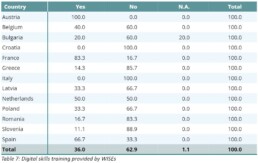
Relevance of digital skills, needs, gaps and training: conclusions
- Considering digital skills, there are no significant discrepancies between the relevance of digital skills and the level of endowment for the three target groups.
- Enablers need most digital skills at work, consequently there are more training initiatives targeting enablers. These initiatives meet the needs of enablers, given that their level of endowment of digital skills matches the relevance of the skills.
- Supporters need digital skills to a certain level and their level of endowment is considered basic or above basic for the skills they need most.
- Finally, it can be noted that workers with support needs require little digital skills at work, this also matches with their level of endowment. Moreover, there are little training initiatives for workers with support needs. The workers do not need digital skills at work, but the self-assessment shows that they do use digital skills at home. This raises the questions if WISEs should pay more attention to the need for digital skills in other contexts, outside of the working environment.
The B-WISE project, Blueprint for Sectoral Cooperation on Skills in Work Integration Social Enterprises, is an Erasmus + project coordinated by EASPD with the support of ENSIE.
Meaningful Christmas gifts from social entrepreneurs
This is the right place to look for meaningful gifts - we've gathered our members' offers for Christmas gifts - from corporate gifts to different experiences, what will be the best gift for loved ones! Do good by giving responsibly!
Find the one that's right for you - we've divided the offer into thematic sections: "To create a festive feeling", "For events", "Corporate gifts", "Gifts for loved ones", "Caring for your health", "Experience a s a gift", "Hobby as a gift", "Gifts for coming together, "Environmentally responsible" "Educational gifts", as well as offering the opportunity to do good deeds instead of buying a gift!
From home decor, crockery collections, corporate gifts, event space rental, and special offers just for Christmas!
TO CREATE A FESTIVE FEELING
"TUVU" CHARITY SHOP - a place to hunt for the best decors
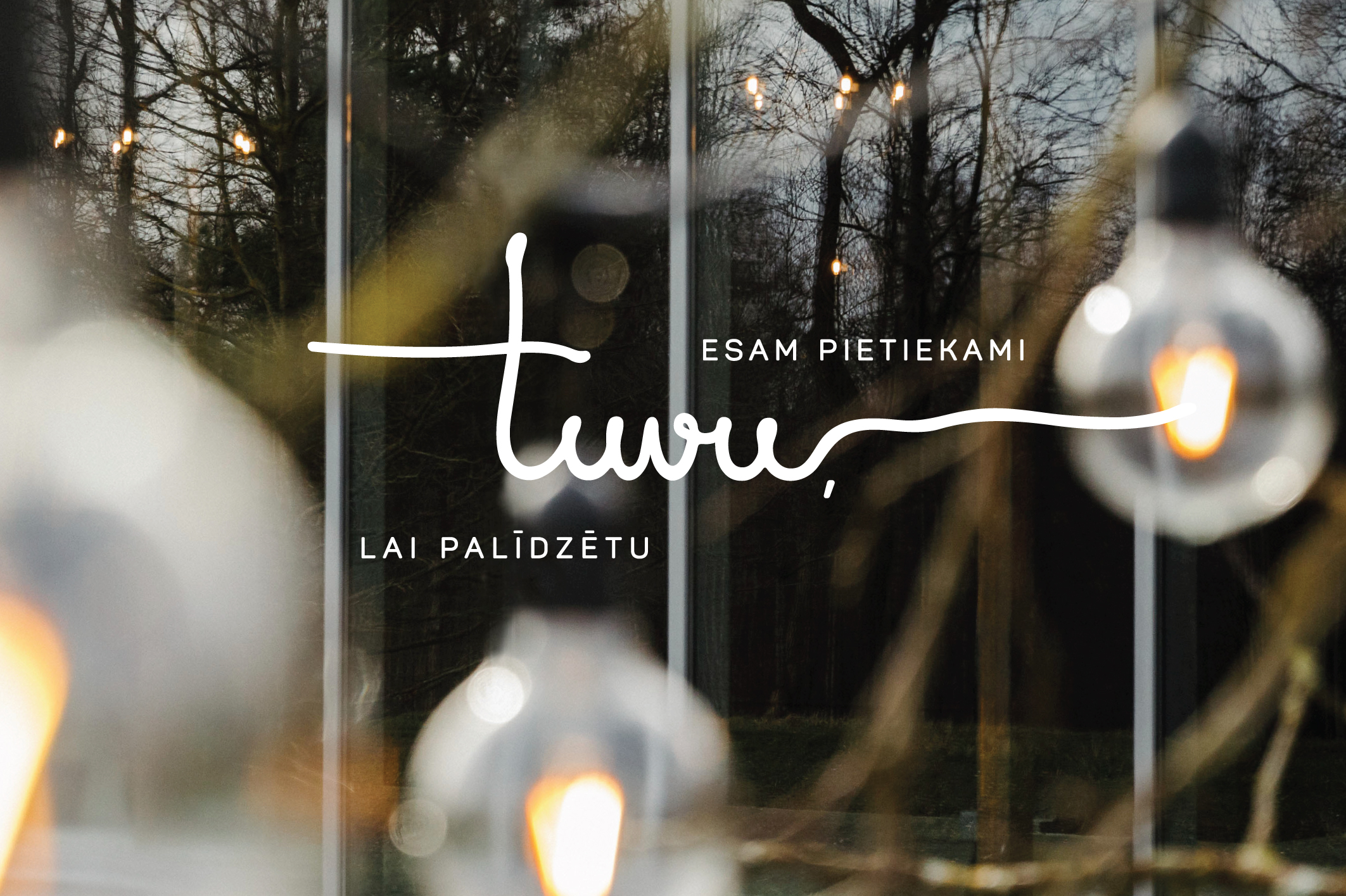
Shoppers at "Tuvu" charity shops have the opportunity to buy not only clothes, shoes, crockery and household goods, but also gifts for their loved ones and to prepare for the festive season by buying some special décor to create the mood, as well as to create a feast for another family or a lonely person by buying these items, as all profits from the shops go to charity projects. At Christmas time, we will surprise families in need with gifts. Other charity projects will continue - working with parents and young people in need, renovating homes in crisis situations, camps and events for young people, helping lonely people.
❄️Find out more: www.biedribatuvu.lv
📧
Address: Pasta iela 51, Jelgava
CHARITY SHOPS "OTRĀ ELPA" - everything for the holidays
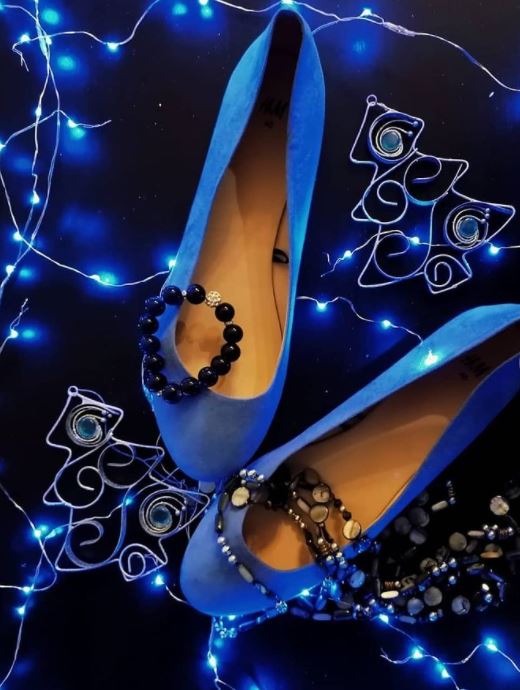
In "Otrās elpa" shops you can find a variety of decorations to create a festive mood, as well as nice value-added gifts for your loved ones. Starting in 2019, the profits of the charity shop network will be donated to the Children's Hospital Foundation and the Children's Clinical University Hospital's organ donor programme to build up emergency savings, thus providing important support to families with children in need of organ transplants outside Latvia. "With every purchase and donation, Second Breath customers give children a chance to live!
❄️Find out more: www.otraelpa.lv
CHARITY SHOPS "HOPEN" - unique products you won't find anywhere else!
HOPEN Charity Shop is a great place to find Christmas gifts you won't find anywhere else! Here you will find candle holders, crockery, vases, design items, children's items. For home furnishing we offer furniture, paintings, lamps, textiles and household goods. There is a wide selection of clothing, shoes and accessories. Profits are donated to charity. Shop and donate!
HOPEN charity shops in Ogre, Skolas iela 18, Riga, Jēkabpils, Viestura iela 7A, Āgenskalns, Mazā Nometņu iela 32 and Imanta, Kurzemes prospekts 132a.
❄️Find out more: www.hopen.lv
GLASS POINT - exquisite decorations for your Christmas tree!
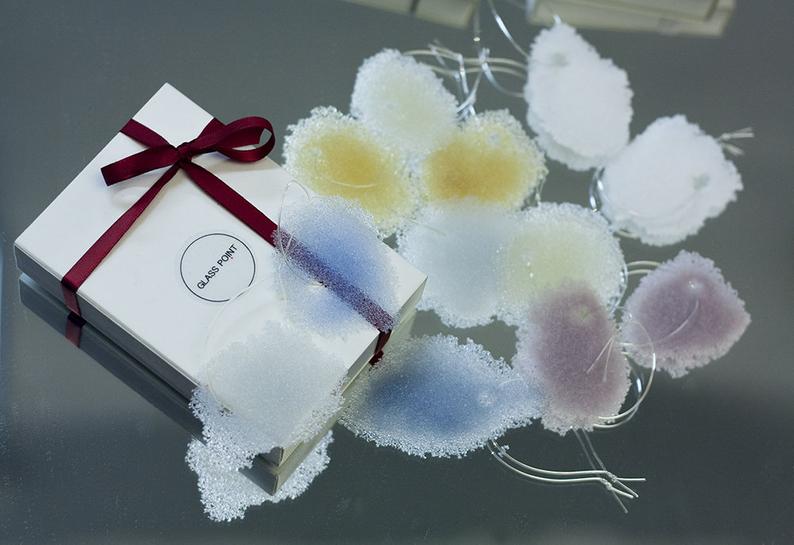
GLASS POINT offers glass snowflakes for the festive Christmas tree. The glass snowflakes were designed by artist Anna Varnese, who has managed to catch the moment and fuse the fragile, light and just like snow - icy clear snowflake in glass! The snowflake set contains 10 snowflakes made from recycled glass, namely glass frit. This is powdered glass from broken glass sheets that are no longer usable as a material for creating products, yet are the perfect artistic solution for creating glass snowflakes!
❄️Order here: 📧
TYPICAL LATVIAN - Christmas tree ornament sets with crystals
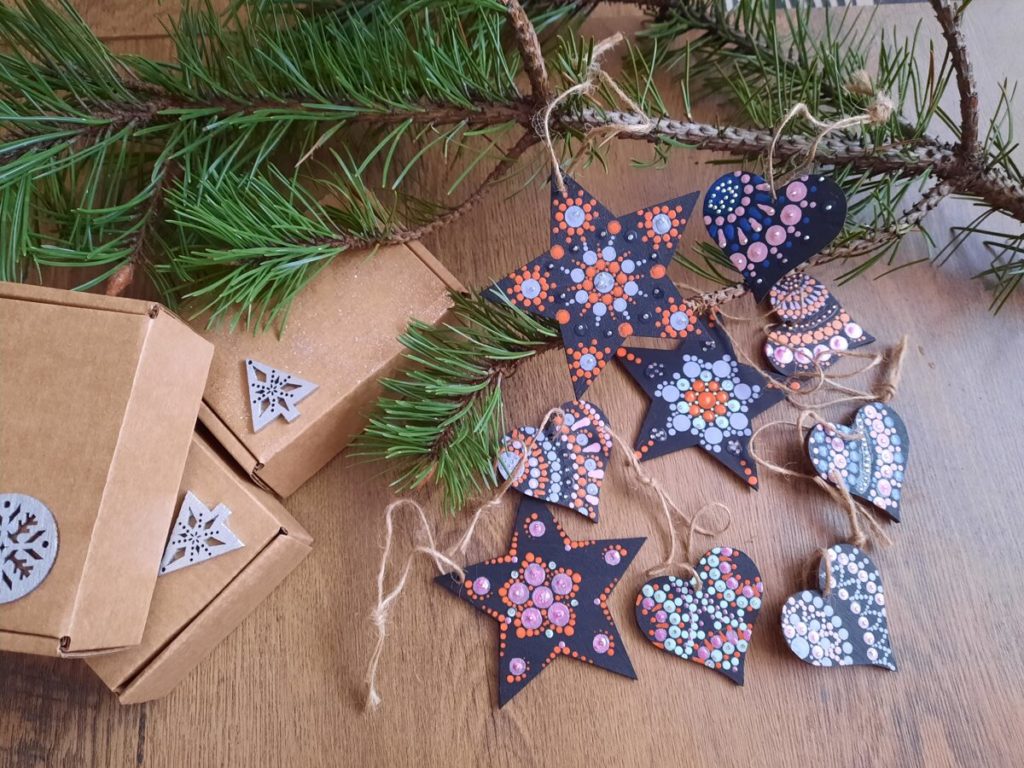
This year Typical Latvian offers Christmas tree decorations painted on both sides with dots! 100% handmade and limited edition.
In the e-shop you will find:
🎄 Christmas tree ornament set with crystals "Glitter" - artificial crystals make the ornaments glow in candle or lamplight, the black colour makes them not only elegant but also highlights the patterns on them.
🎄 Christmas tree ornament set "Joy" - colourful ornaments will bring joy every time you look at the tree. The ornaments are painted on both sides but in different ways, giving the impression that there are more ornaments on the tree.
❗️ Importantly, no two sets of ornaments are the same, so your tree will have special ornaments!
🎄 In addition to the ornaments, you can buy a pocket-sized notebook in the same style, waiting for the poet's quatrains on its pages. We will also be delighted to see quotations written by a book-lover or notes observed in everyday life. If you recognise yourself or a friend in these lines, this could make a lovely festive gift!
❄️Buy in e-ashop: www.typicalpostcards.eu
or write a message: 📧
ĀAGENSKALNA MARKET - Christmas markets
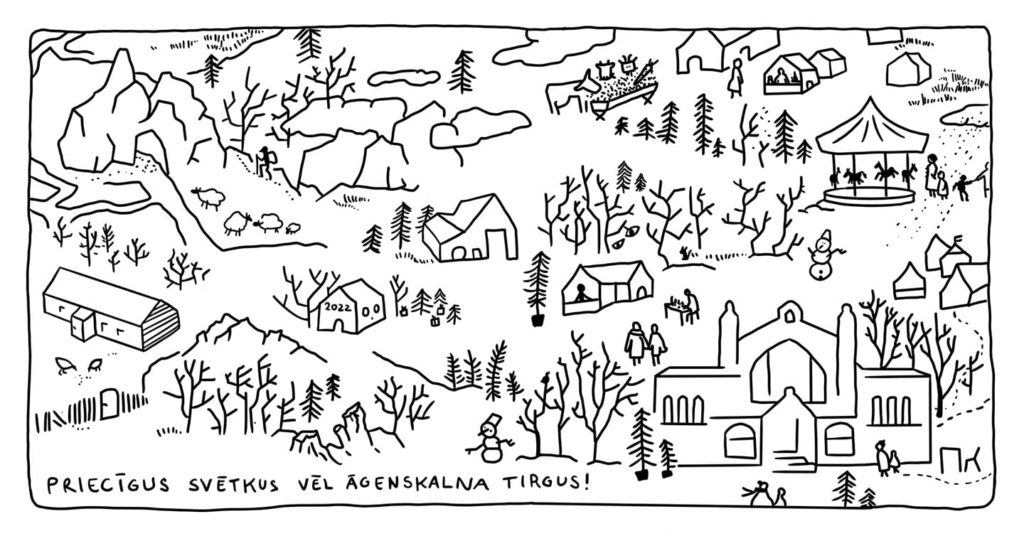
First Christmas markets at the renovated Agenskalns Market! This year, from November 24 to December 31, little surprises and discoveries await at every turn of the Christmas market - unexpected flavours, intriguing stories and personalities, traders from all over Latvia, freshly baked gingerbread, hot drinks, warm knitwear and original gifts. Spend time with family and friends chatting over mulled wine, enjoy lunch or brunch in the 2nd floor cafes and soak up the market and Christmas atmosphere all month long!
❄️Find out more: www.facebook.com/Atirgus
The market is located at 64 Nometņu Street, Riga
FREE RIGA - Wishkaļi Christmas market
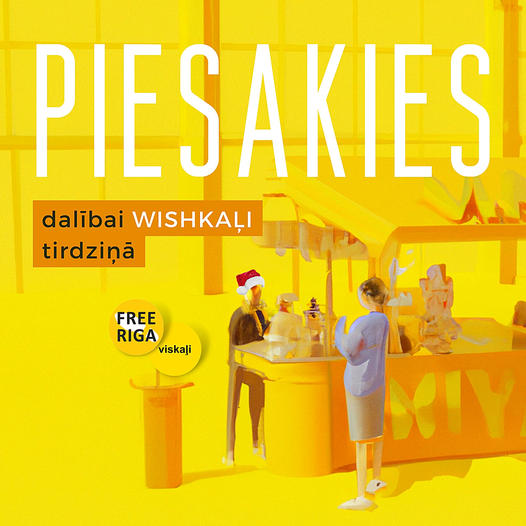
🎄 Apply for the WISHKAĻI Christmas Market! From 10 to 11 December, the WISHKAALI Unseen Things Design Market will take place in Viscagli. If you create, make, design, paint, sew or carve, this market is for you - take part and show what you can put on the table!
Apply here https://ej.uz/gribuwishkali
If you don't feel like trading, head to the Institute for Quality of Life and Design, 36a Viskaļi Street, on 10 and 11 December to shop for yourself!
❄️Find out more: www.facebook.com/FREERIGA
📧
FOR EVENTS
BRANKU BRANČOTAVA - a welcoming place for your events!
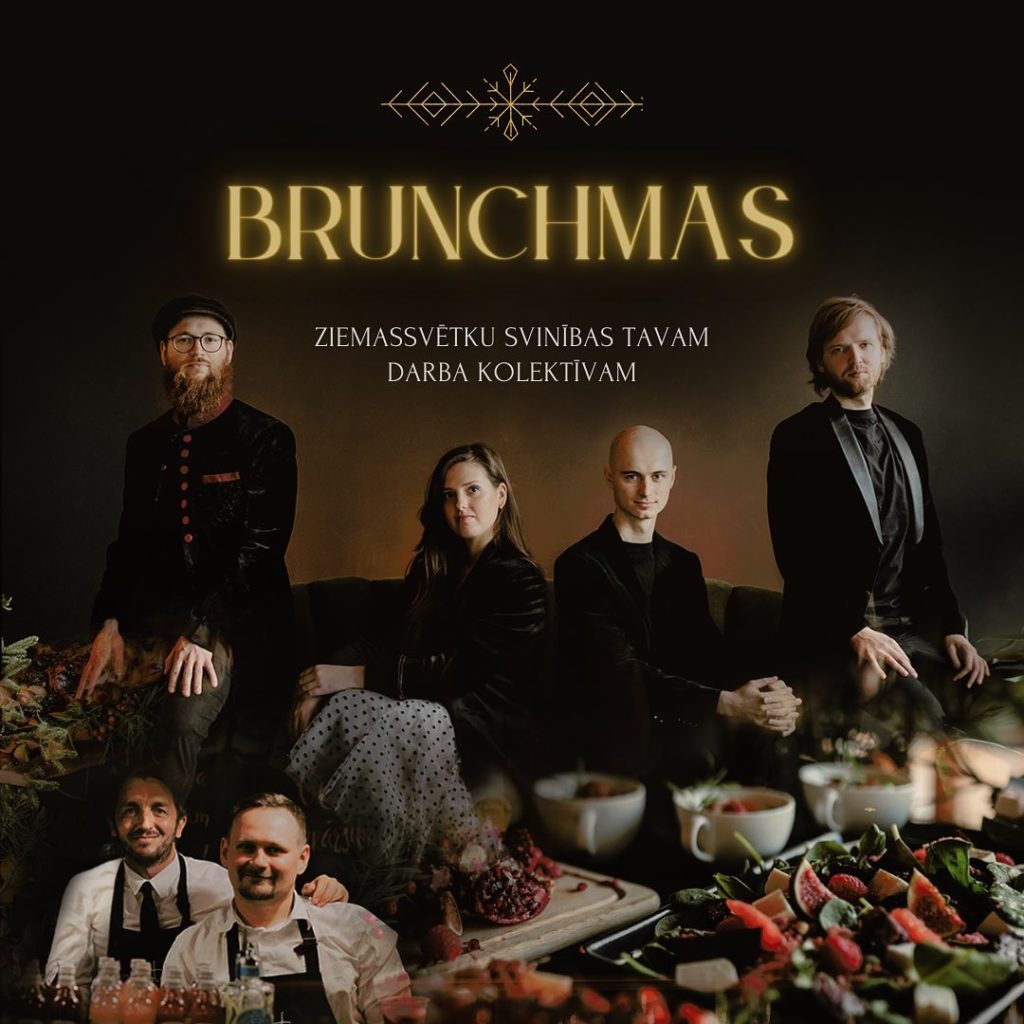
Only 39 kilometres from Riga, Branku Brančotava is waiting for you in Brankas, Ozolnieki municipality. It is a place for your celebrations and work, offering 180 m2 of space divided into two parts. For various events we offer a hall that can accommodate up to 150 people. Our "badge" is the glass walls, which give the rooms a light and cosy atmosphere during the day and a romantic feeling in the evenings. We've taken care of EVERYTHING, all you have to do is turn up! All profits go to the charity projects organised by "Tuvu", which you can find out more about HERE.
❄️Find out more: www.facebook.com/brankubrancotava
📧
📞 +371 22842016
CORPORATE GIFTS
SVAIGI.LV - gift baskets from local farms
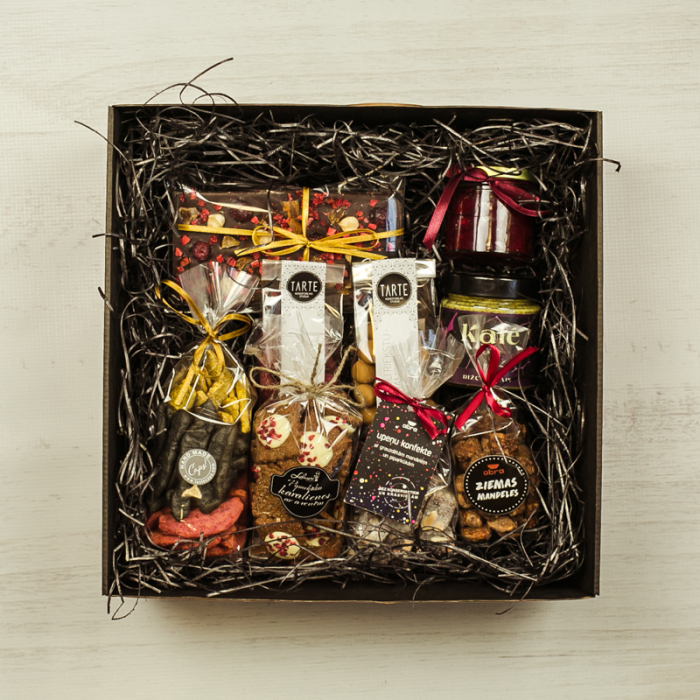
When you receive a gift, a special story is placed in your lap. It combines the best of Latvian farmers' products and craftsmen's work. Behind every product there is a real owner! Our own! This year, our gift story has a special place for dreams. We will prepare gift sets according to each company's needs, changing or adding to them, wrapping them in a gift box with a box, filling them with decorative shavings and binding them with ribbon matching the company's colours. We will deliver to the office or to each recipient individually.
❄️ Buy gifts: www.svaigi.lv
📧
📞 +371 24335225
ORNANDUM - tableware printing and sustainable promotional items
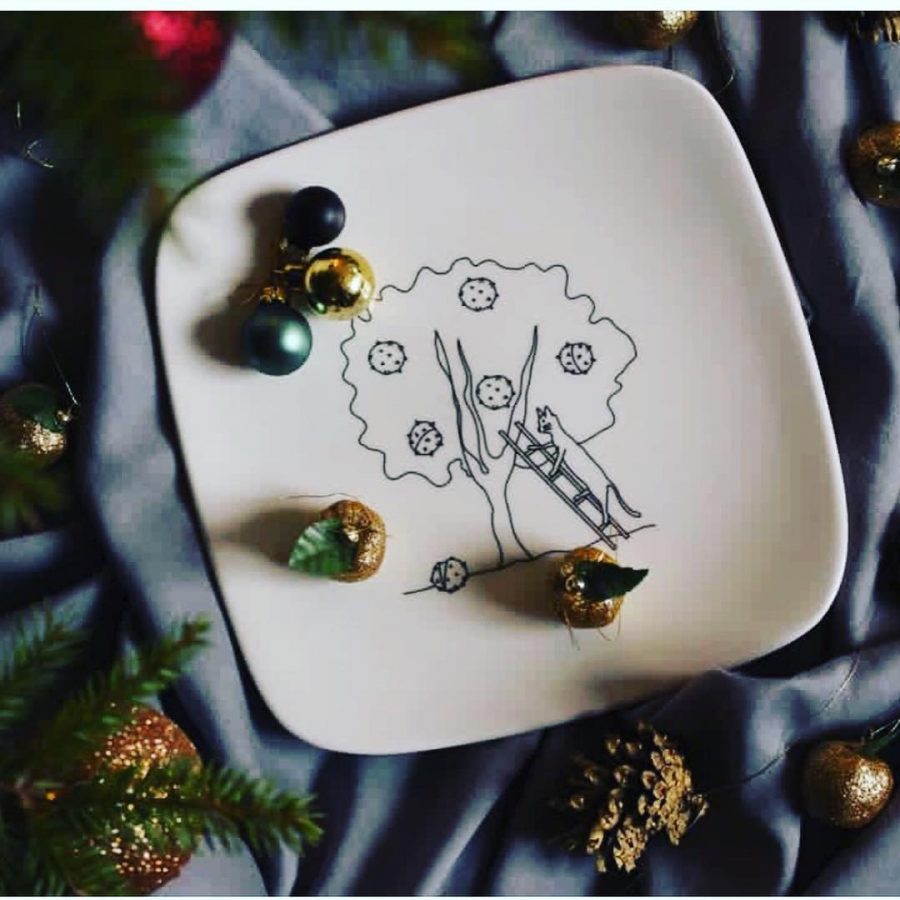
"Ornandum" invites companies to promote their brand, attract new customers and strengthen employee loyalty with sustainable promotional items and printed tableware that have the added value of quality printing with a design created especially for you.
❄️Find out more: www.ornandum.lv
📧
📞+371 28641536
RB CAFE - delicacies made with love
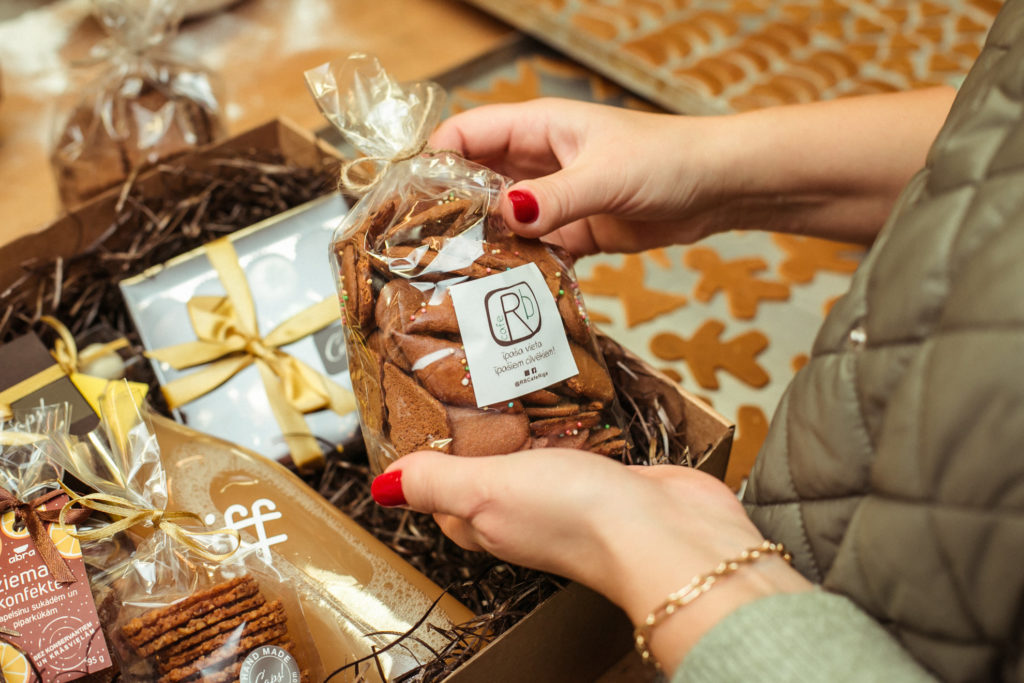
RB Cafe offers excellent pastries and makes and wraps gingerbread, biscuits and truffles beautifully at Christmas. A great gift for loved ones and as a corporate gift. RB Cafe is a special place for special people and the delicacies are prepared by people with disabilities. In addition, RB Cafe offers catering services at events and will provide great coffee breaks, lunches and dinners! RB Cafe is currently no longer open, but all orders can be placed by Facebook or email!
❄️Find out more: www.facebook.com/RBCafeRiga/
📧 r
VISI VAR - handicrafts made by socially vulnerable groups

The charity shop "Visi Var" is a social enterprise founded by the association "Cerību spārni" to promote employment for people with disabilities, their relatives and socially vulnerable groups. Every single thing we create is made with great care, with genuine love and gratitude for the opportunity to work and spend time in a meaningful way. So when you buy our products, you are truly supporting an extraordinary person's dream of an independent life.
In our shop you will find beautiful and useful things for everyday life and for celebrations for yourself or your loved ones. Our sewing service creates beautiful and quality clothing for adults and children, as well as a variety of textiles for the home. In the ceramics workshops, people create beautifully shaped and designed vessels. In the candle workshops, love is poured into each candle, warming it as soon as it is lit. Woodworking is a new and proud activity, where our guys polish each thing they make to ensure it is of good quality and useful. You may also find the warmest wool socks in our shop, because each stitch is knitted with gratitude. And more, and more!
❄️Buy here: visivar.lv or visit in person:
Adress: Institūta street 5a, Sigulda.
Arte Pastry - original chocolate sweets

Take a bite into our old-fashioned chocolate bars and you’ll be transported to the days when passion was still in vogue. We use only premium ingredients, such as single origin cocoa beans from around the world - some say it is even better than what they were growing themselves! We combine traditional techniques with modern flavours for an exciting taste experience like no other
❄️Buy here: www.artepastry.com
GIFTS FOR LOVED ONES
IMANTS ZIEDONS FOUNDATION "VIEGLI" - books, music and souvenirs
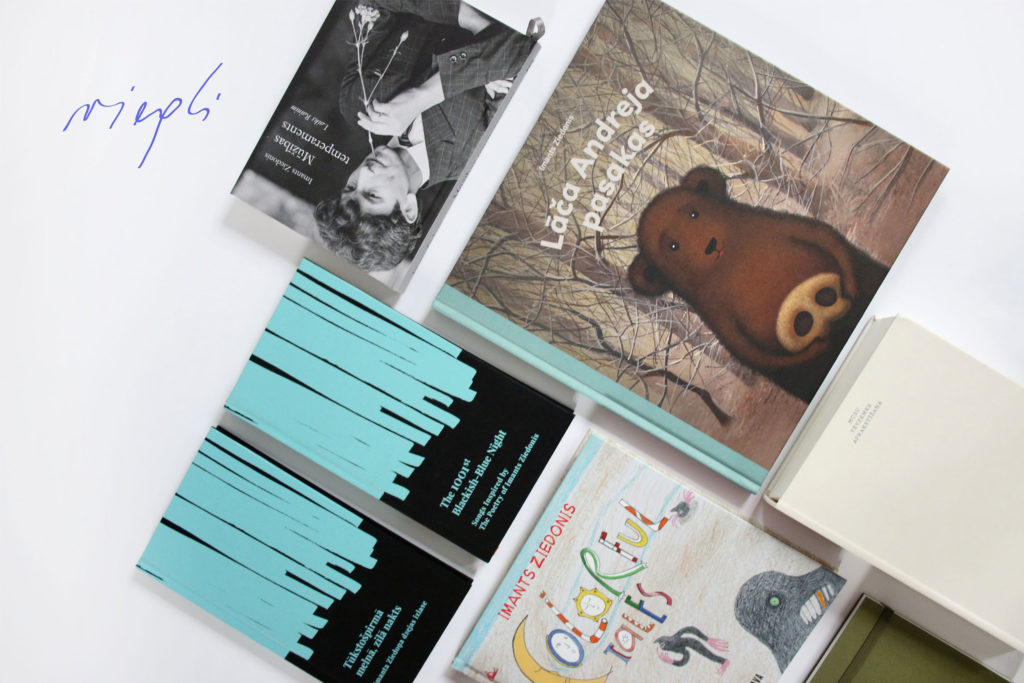
The Imants Ziedonis Foundation's "Viegli" e-shop is a convenient, fast and handy place to buy books, music recordings and souvenirs published by the Foundation. As the "Viegli" Foundation is a cultural NGO, by purchasing anything from the Foundation's e-shop, everyone supports the activities and projects of the Ziedonis Museum and Library and "Ziedonis Class".
❄️Buy here: fondsviegli.lv
TIPTIP.LV - gifts made by seniors and people with disabilities

This year, www.tiptip.lv offers Christmas gifts made by Latvian seniors and people with disabilities - knitwear, leather and paper products, wicker weavings, candles, dishes, jewellery, toys, greeting cards and much more - almost 2000 items in total, created by more than 50 socially disadvantaged people.
Each purchase will be gift-wrapped and will come with a short story about the maker, who will receive a self-determined price for your purchase. This way, you will have the joy of giving and receiving, while knowing that you have financially supported the author of the work - a Latvian senior or a person with a disability - this Christmas. Individual and corporate orders are possible!
❄️Buy here: tiptip.lv
SOS CHILDREN'S VILLAGES - send a card and support a SOS Children's Village!
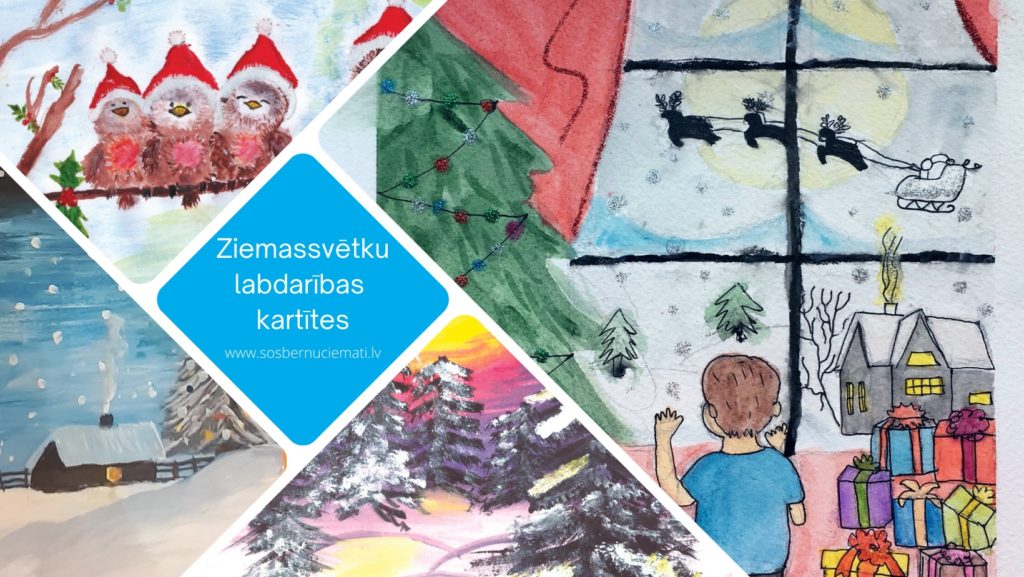
Handwritten greetings are special. This year, they will be appreciated even more than before by family, friends and business partners. You can still buy, write and send a lovely greeting! Take a look at the beautiful Christmas cards created by children from SOS Children's Villages and our artist friends.
❄️Buy here: sosbernuciemati.lv.
DESIGN ELEVATOR - coloring posters
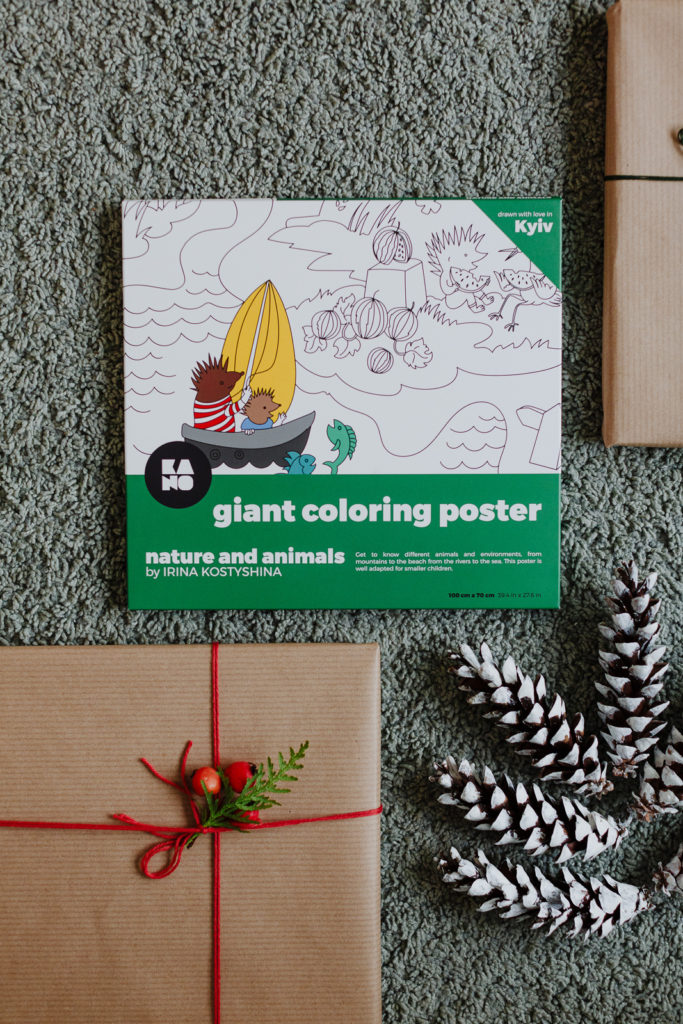
DESIGN ELEVATOR presents giant colouring posters created by its subsidiary Kano Editions. Together with talented illustrators from all over the world, the company creates high-quality, ecologically and socially responsible colouring posters. The posters are suitable for children to colour individually or as a family activity.
🎄 High-quality illustrations - each illustrator demonstrates their own unique vision and brings their characters into the world. Currently, 2 Latvian and 3 Ukrainian illustrators have created posters.
🎄 For different ages - some of the posters are specially designed for little ones, but there are also some that adults will love to colour!
🎄 Sustainability - 100% biodegradable product and packaging. Printed with vegetable inks.
🎄 Giving back - 10% of profits are donated to charity, supporting projects and initiatives chosen by the illustrators. We also employ people with disabilities and work with a day centre for people with disabilities for quality control and packaging of illustrations.
❄️Order here: www.kanoeditions.com
Enter code LSUA2022 and get 20% discount on purchases made before 26.12.2022!
AD ASTRA COACHING - You can! Book
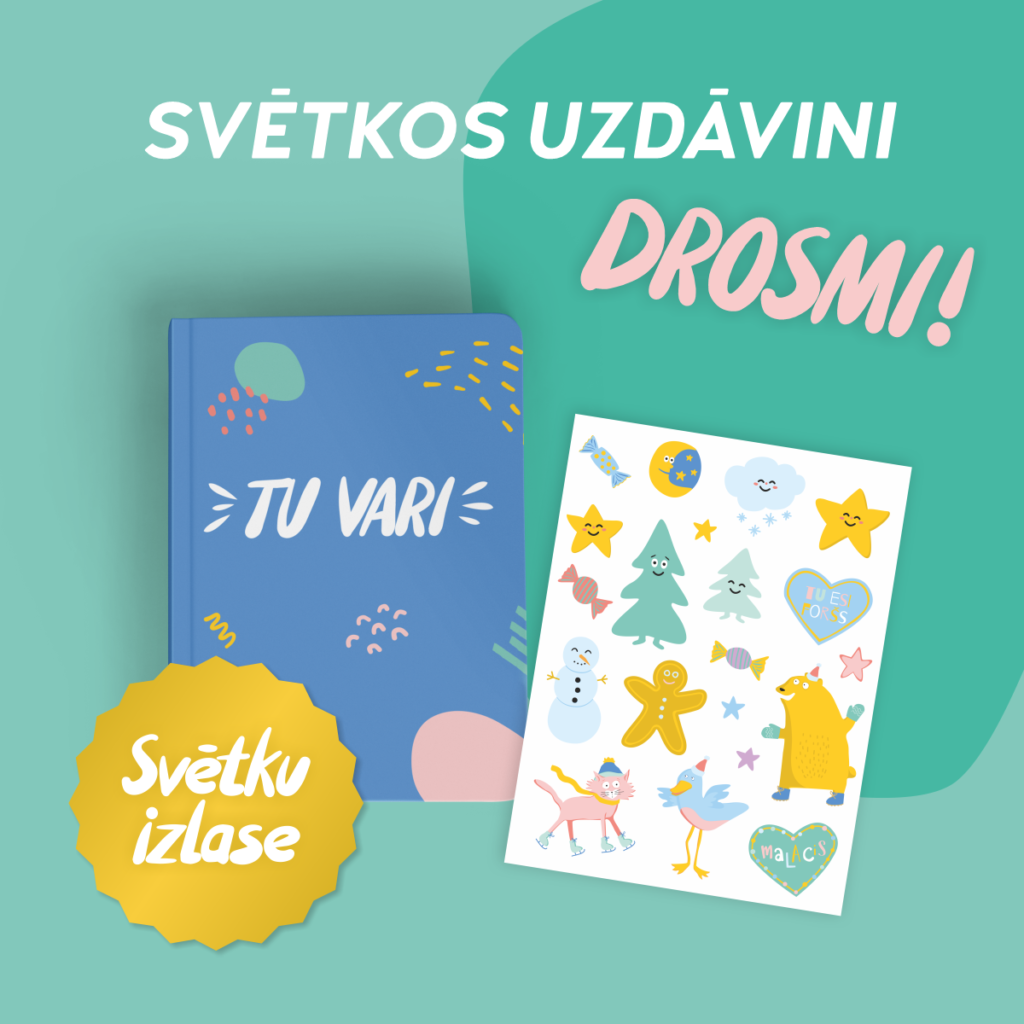
Support your child on the path to their dreams! YOU CAN! is a step-by-step planner for the whole family, helping you to discover yourself and your superpowers, to dream bold dreams and to learn how to make them happen.
❄️Order here: www.esvaru.lv
📧 hello@esvaru.lv
ENGINEERING FOR CHILDREN - educational books for children
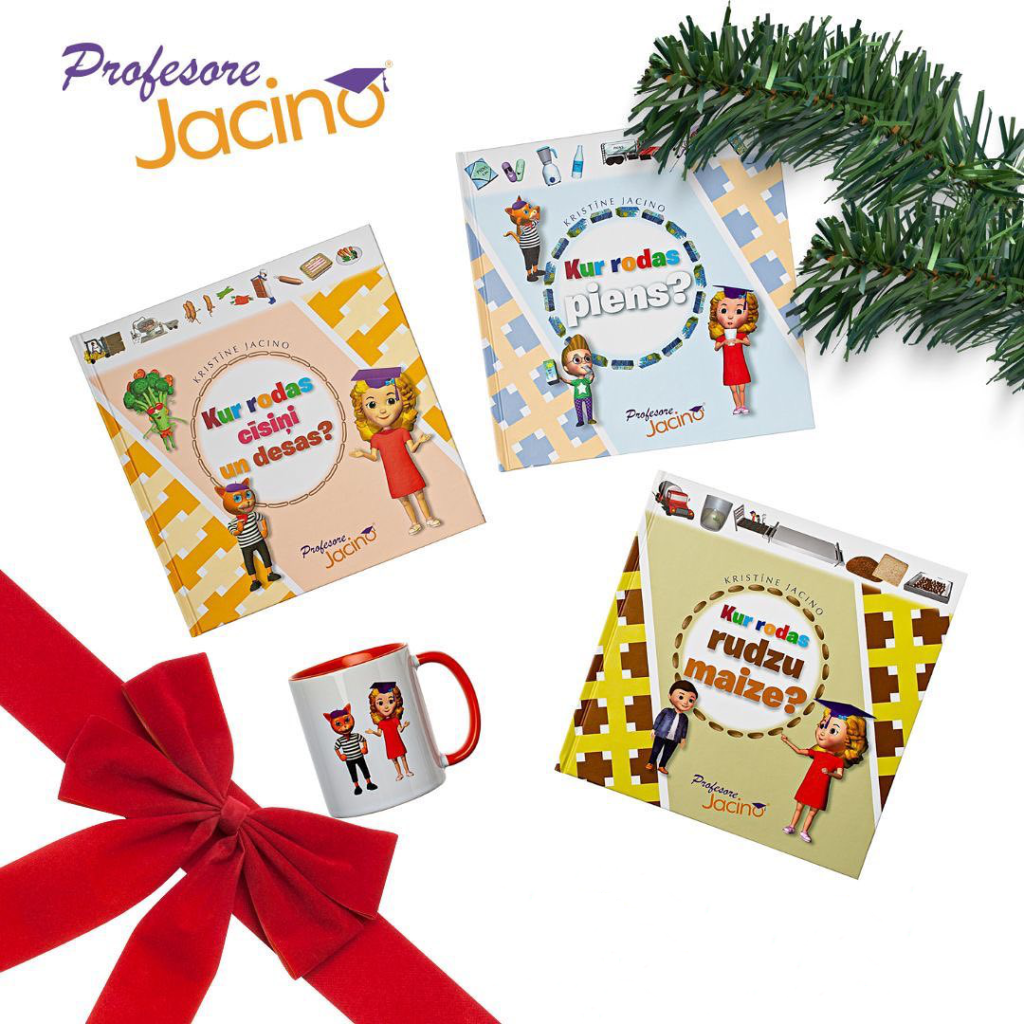 The author, Kristīne Jacino, is a PhD in food engineering with many years of experience in the food industry. She is the creator of the "Professor Jacino" brand, founded the company "Engineering for children" and creates and develops diverse, interactive and entertaining educational projects for children.
The author, Kristīne Jacino, is a PhD in food engineering with many years of experience in the food industry. She is the creator of the "Professor Jacino" brand, founded the company "Engineering for children" and creates and develops diverse, interactive and entertaining educational projects for children.
The Professor Jacino books will make a great gift for children:
🎄"Where does milk come from?" A step-by-step account of the milk's journey from the goat to our kitchen,
🎄 "Where does rye bread come from?" how rye bread gets from the cornfield to our kitchen,
🎄"Where do sausages and sausages come from?" tells us how sizzlers and sausages get to our kitchen.
❄️Order here: www.professorjacino.com
📧
BURBUĻU SPĒLES - bubble blowing kit for learning the alphabet
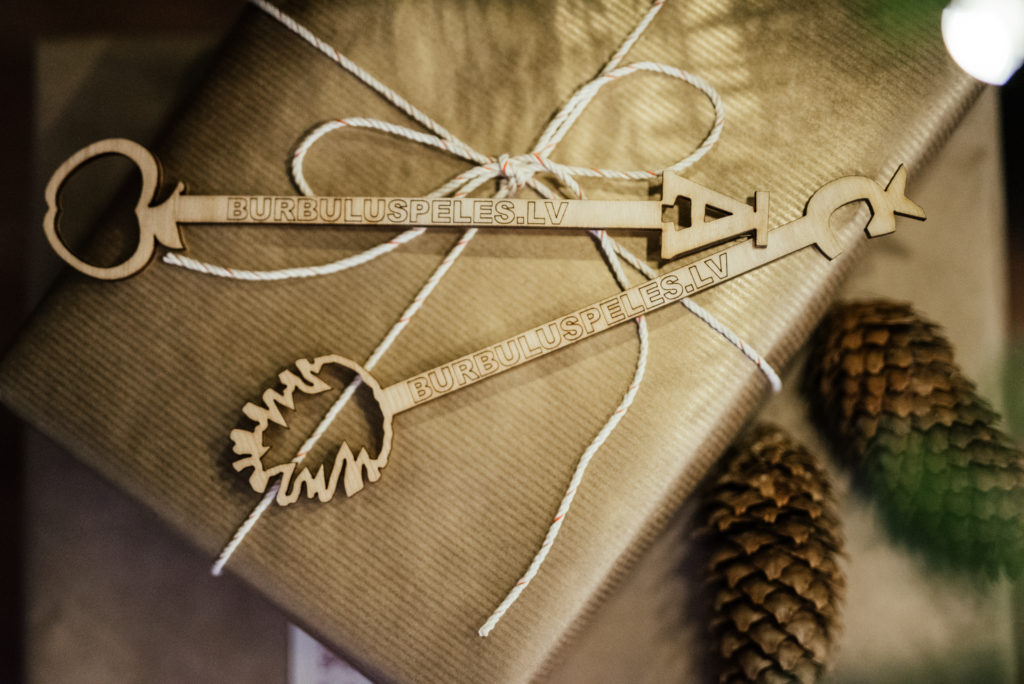
The bubble blowing set "Burtiņburbuļi" is an opportunity to learn the letters of the Latvian alphabet in a different way! By blowing soap bubbles, you can learn the alphabet and boost your speech articulation skills. Bubble games are a stimulator for speech development, allowing the child to think, encourage action or react to a situation. Bubble games motivate children to initiate communication, conversation, learn letters and increase vocabulary. Bubble Games Ltd was founded with the aim of helping children develop their speech and language skills.
❄️Order here: burbuluspeles.lv
📧
4 VĒJI - individually made soaps

The 4 VĒJI (4 WINDS) soap is created to support the employment of people with disabilities. They come in different shapes and colours and all use natural additives. The soaps are handmade and we put our love and craftsmanship into each piece. Due to the nature of handmade soap, the weight of the soap is approximate, as soap shapes are available in different variations.
❄️To order, send a note: facebook.com/socialais.uznemums.4veji
Find out more: www.4veji.lv
📞+371 29345720
CARING FOR YOUR HEALTH
Correcty - posture-correcting T-shirt

Take care of yourself and your loved ones with a Correcty posture correcting t-shirt that will give you confidence and help you fight bad posture! The Correcty T-shirt features a special corrective circuit which, when the shoulders are hunched forward, contracts back more strongly than in other places like a spring and reminds you to keep your shoulders straight. Correcty is a passive back exercise, because only the muscles in the stretching form the correct posture! Correcty will help to train your back muscle memory, prevent pain, tightness and incorrect spinal postures, and help you to breathe easier.
❄️Order here: www.correcty.eu
DZĪVĪBAS POGA - care for seniors
The Life Button (Dzīvības poga) is a remote alert system that keeps you connected to your loved ones in unexpected situations that may require medical attention. The Life Button ensures that qualified personnel are on hand in case of an emergency, for example when a loved one is injured or cannot call for help at all times. Available as a bracelet or pendant, the Life Button is always close by, unlike a telephone.
❄️Order here: dzivibaspoga.lv/pasutit
📧
NGO "GAISMAS LAIVA" - thermal raincoats
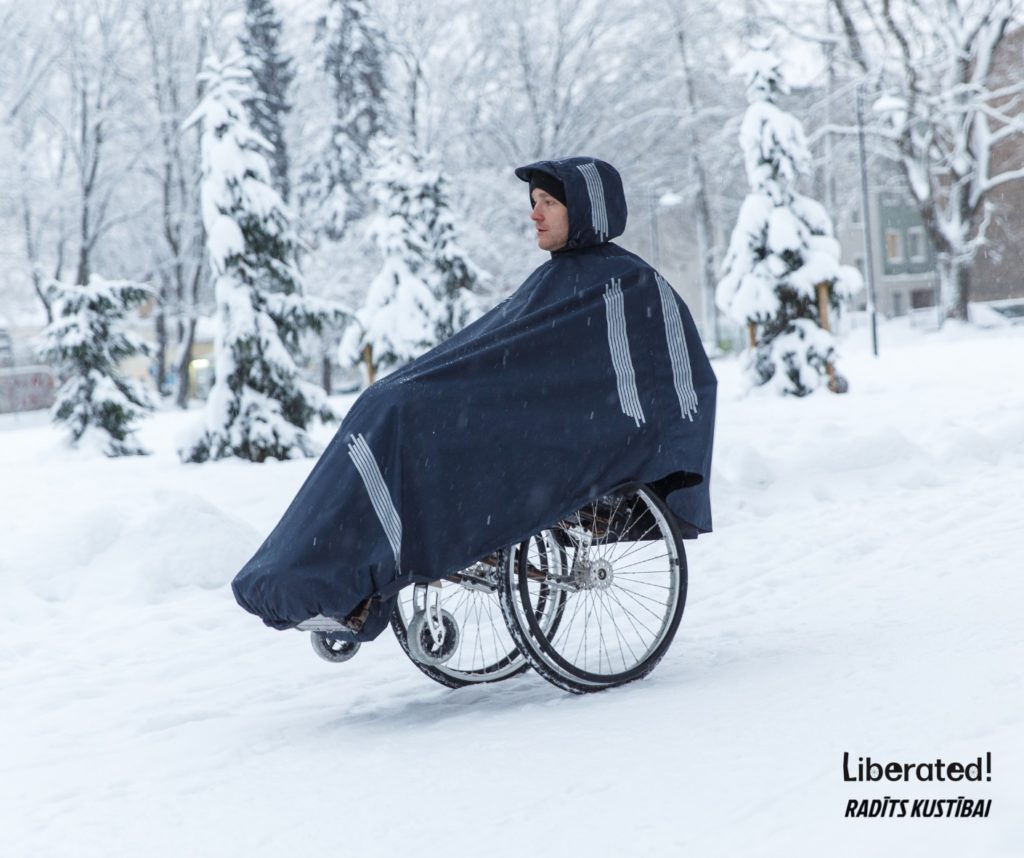
For many, winter is one of their favourite times of the year, but for people with reduced mobility, it's full of challenges - uncleared and impassable pavements, muddy wheelchair wheels, wet snow... brrr...
Light Boat develops raincoats that are practical, waterproof and all-season, suitable for winter wear. The sleeveless raincoat is comfortable to wear and doesn't get caught in ruts, and also has reflective design elements to protect in twilight weather, making it more visible on the road.
Be safe and protected from moisture to roll forward with purpose! 🎯
🤝 Support us by donating to give a kit to someone who needs it most! If you are a company, organisation or association, contact us and buy our products for your disabled people to make everyday life easier and keep you safe outdoors when you are in a wheelchair!
❄️To order, send a message:
Find out more: gaismaslaiva.com | www.gl-development.lv
EXPERIENCE AS A GIFT
GLŪDAS MĀJ-SKOLA - creative workshops for children
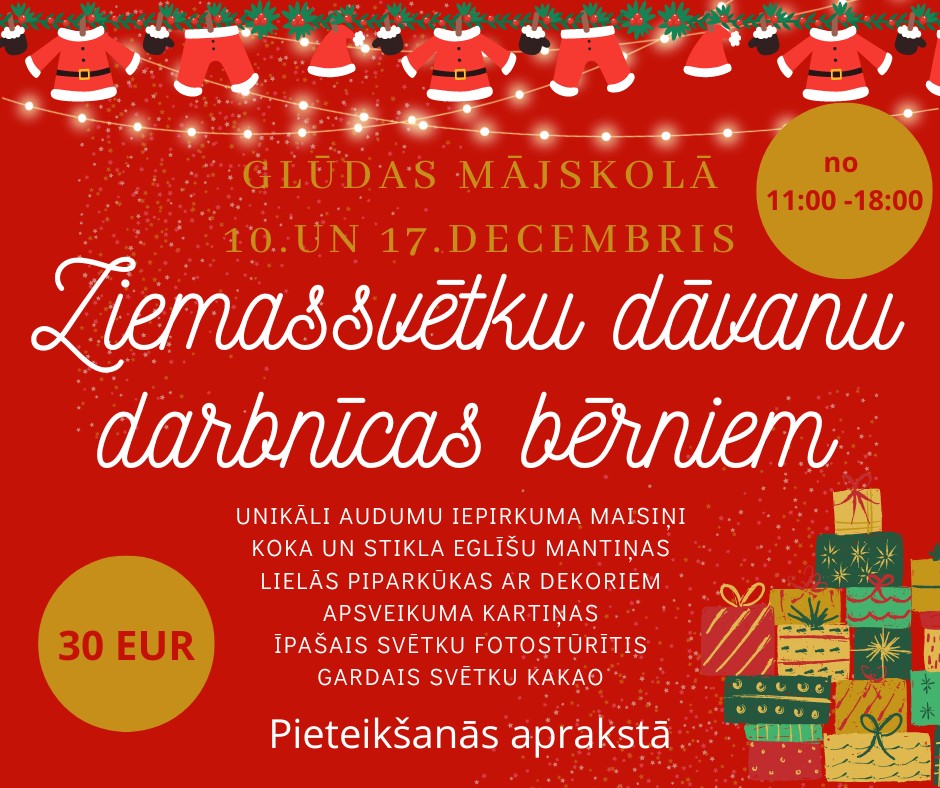
By giving homemade gifts, we share the best of our hearts!
Glūdas mājskola (Gluda Home School) invites children to learn various Christmas gift-making workshops that will enable them to prepare presents for their friends, mothers and fathers, brothers and sisters. Together we will make unique fabric shopping bags, glass and wooden tree ornaments, large gingerbread houses with decorations, greeting cards. During the class we will enjoy the special Gluda Homeschool cocoa and create a mood in the festive photo corner. Participation fee per child - 30 eur.
❄️Find out more: Glūdas māj-skola
📧
📞 +371 28382308
CCI TORŅAKALNS - gong meditation
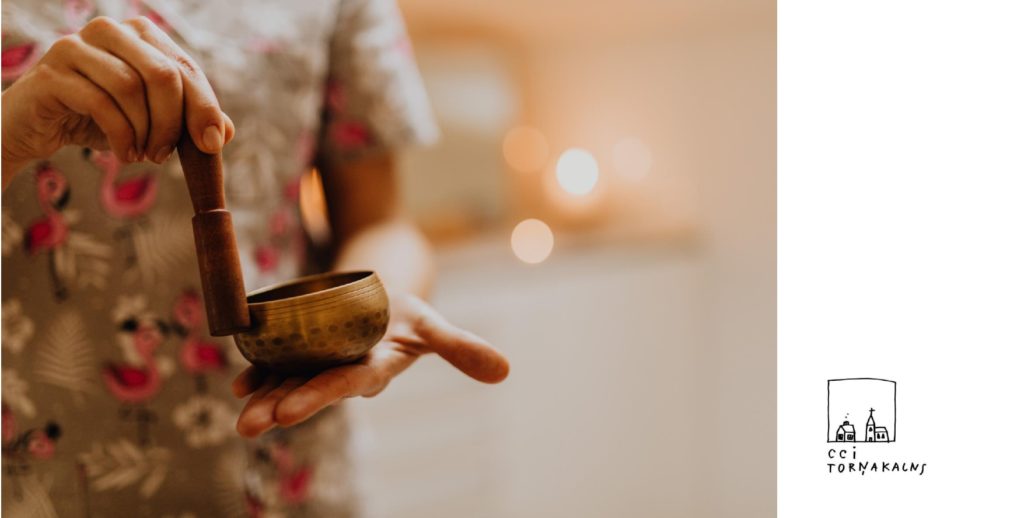
How should we spend the time of waiting for the festive season to find peace within ourselves?
The Centre for Human Growth "Tornakalns" invites you to gong meditation classes! The gong is a sacred meditative instrument, thousands of years old, that has been used for centuries to heal the mind and body. Immersion in the healing vibrations of the gong helps to achieve deep relaxation, releases control of our mind and perceptions and allows us to become free from blockages on a physical, emotional and psychic level.
Gong meditation is usually done lying down to allow the body to relax completely. Bring a mat to lie on, a blanket to cover yourself with and a small pad for the headrest. If there are any health restrictions, it is possible to be seated during the meditation.
The classes are for people with and without experience in gong meditation. Gong meditation is under the guidance of gong meditation teacher Linda Straume.
❄️Find out more: www.izaugt.lv
Apply HERE
DABAS ZIRGI - walk with a horse
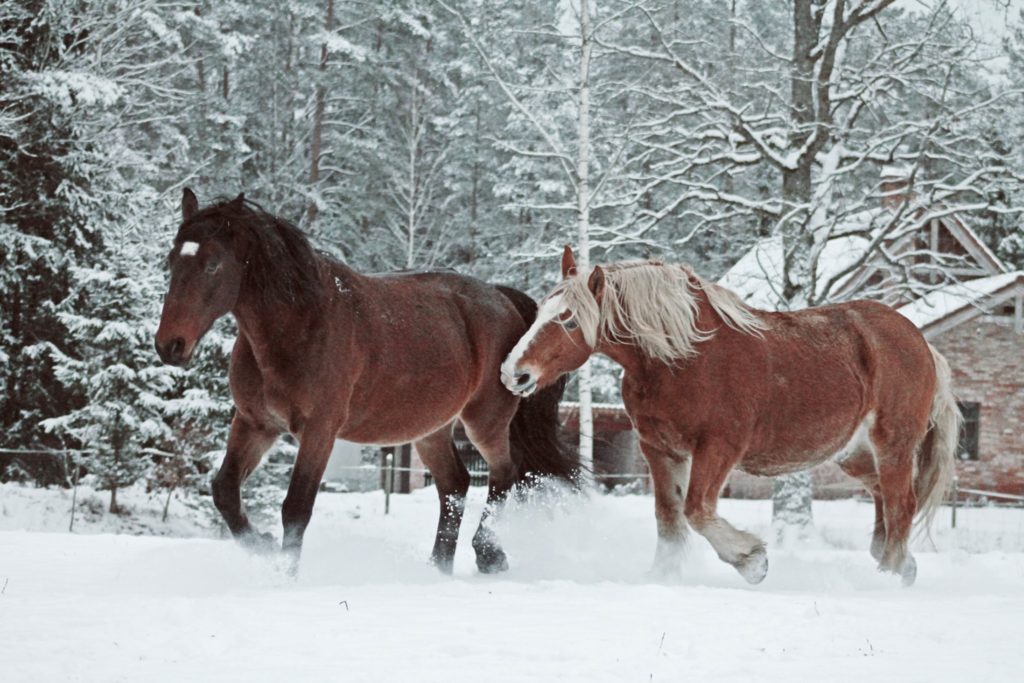
Where else better to enjoy adventure now than outdoors and in the fresh air! Dabas zirgi offers you a nice walk in the forest with one of our friendly horses! You will be able to choose which horse to walk with, cuddle it and feed it with carrots! Remember that the walk is done with the horse by your side!
❄️Find out more: www.dabaszirgi.lv
📧 i
THE INVISIBLE WORLD - interactive tours in the dark
Can you remember the last time you wondered about something? When, after visiting a new place, you remembered it and recommended it to your friends because the experience was amazing? You are invited to visit a very unusual museum - a museum in the dark, where you can't see the exhibitions, only feel them. A guide, for whom the lack of light is part of everyday life, will help you to navigate through all the rooms of the museum and to find your way in the dark. A tour in the dark - give this adventure to your friends!
❄️Find out more: www.neredzamapasaule.lv
📧 i
OPERET THEATRE - theatrical concert programme
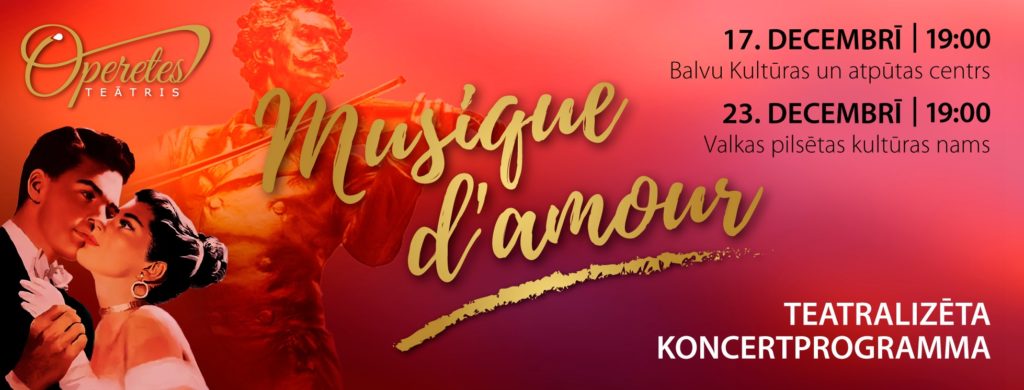
On Saturday, 17 December, at 19:00 at the Balvi Culture and Leisure Centre and on Friday, 23 December, at 19:00 at the Valka City Culture House, a theatrical concert programme "Musique d'amour" ("Music of Love") by the Operetta Theatre will be performed. It will take you into the charming world of Viennese music, offering the audience music about love, music that we love and know, music that is made to delight and create celebrations. The concerts will feature opera divas Sonora Vaice (soprano) (17 December), Anta Jankovska (soprano/Italy), Laura Puren-Kancane (soprano), Patricia Kozlowska (soprano; Alfr. Kalniņa Cēsu Music Secondary School student), Kārlis Rūtentāls (tenor) (23 December), Guntars Ruņģis (tenor) (17 December), Dainis Kalnačs (tenor), NaurisIndzeris (baritone), violinist Raimonds Ozols and pianist Agija Ozoliņa-Kozlovska.
❄️FInd out more: www.operetesteatris.lv or www.operetesfonds.lv
Tickets can be purchased at the Biļešu paradīze box office and online.
HOBBY AS A GIFT
LABORATORIUM SCIENCE SCHOOL - online chemistry, physics and electronics lessons
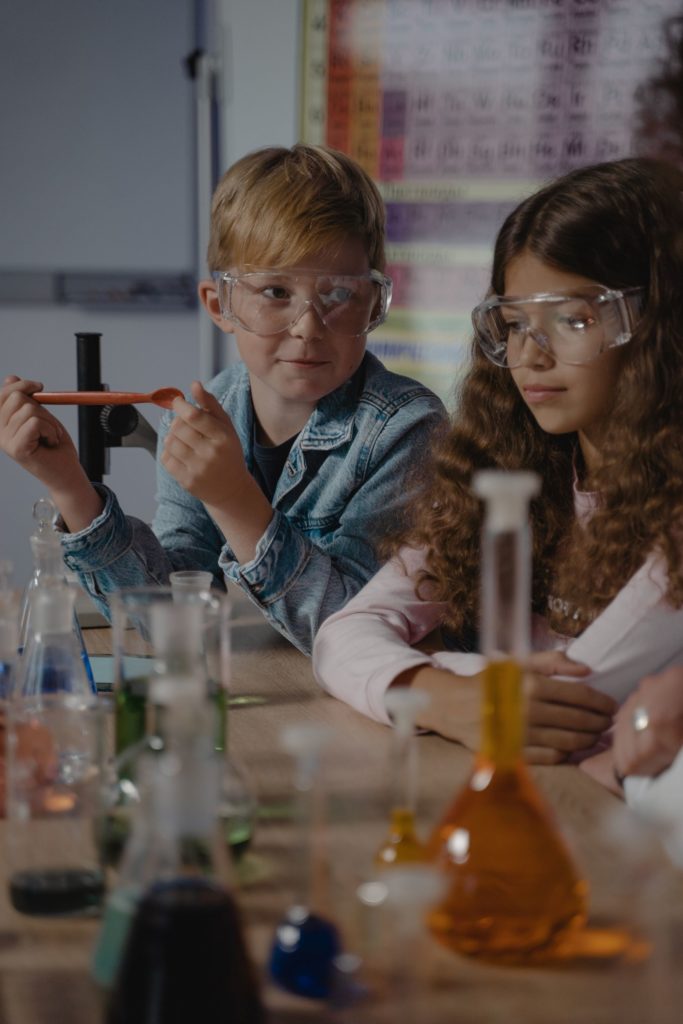
Laboratorium Science School offers systematic classes in chemistry, physics and electronics for children and teenagers:
2nd-9th graders in chemistry and physics,
6th-12th graders in electronics,
10th-12th graders in chemistry.
During the lesson, the teacher explains the theoretical part using a presentation, and shows and performs experiments with the children. During the lesson, students can also see other members of the online group, share what they have already done and communicate with each other. It is a real lesson with a two-way connection as well as a feeling of satisfaction for the work done!
❄️Find out more: zinatnesskola.lv
📧
📞 +371 28804919
BJMK - your wings of growth in music
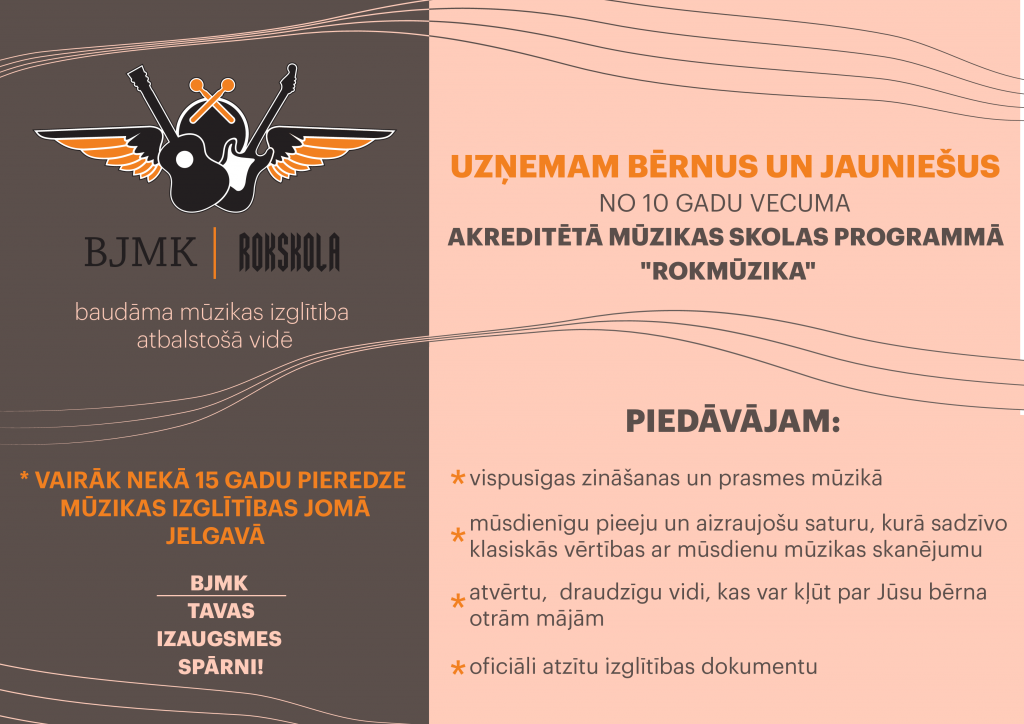
🎵 Start a new year with a new hobby!
BJMK gives children and young people the opportunity to fill their free time with quality time by learning a musical instrument, and to create an interest and appreciation for music in young people.
There are two ways to learn music and instruments at BJMK:
1) By attending individual lessons or small group lessons in an interest-based education format - this offer is available to all ages;
2) By enrolling in the BJMK Rock School and studying a vocational education programme alongside general education.
❄️Find out more: www.bmjk.lv
📧
BENEFICE DANCE SCHOOL - dance classes for all
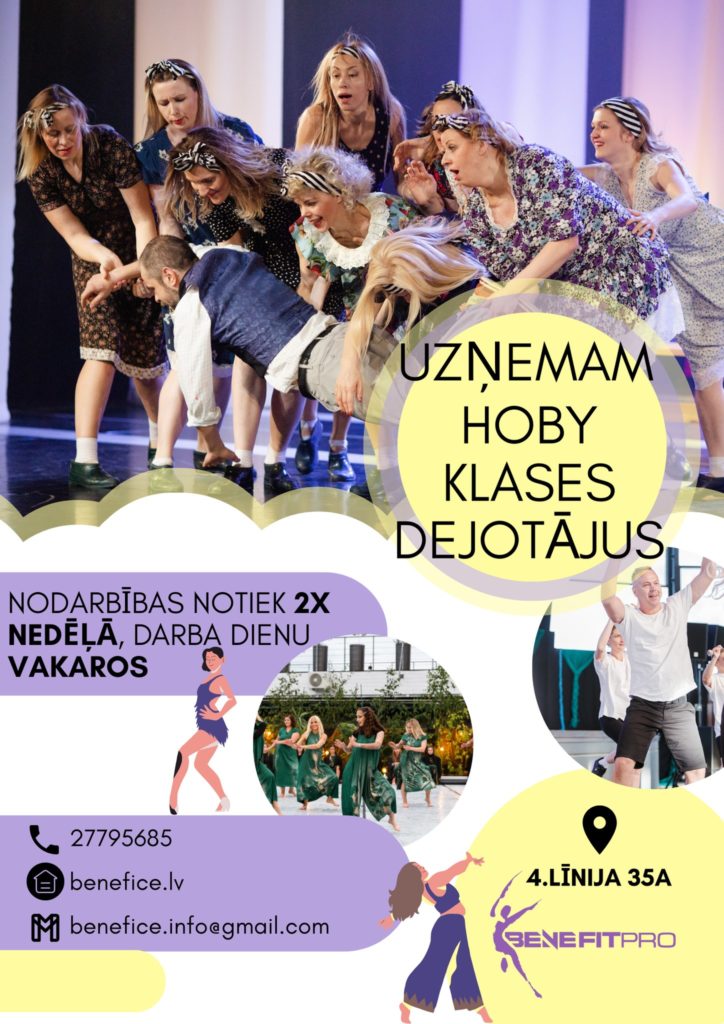
Benefice Vocational School of Dance has created its own nest, a place for YOU to be after school, on weekends, when you want to dance and move.....come to us, it IS a place for YOU! There is a place for your professional development in 3 beautiful halls with mirrors, ballet bars, acrobatic equipment. There's a special dressing room for you and a place to celebrate, study or relax.
We welcome dancers from the age of 3 from December 1!
❄️Apply HERE
Find out more: www.benefice.lv
📧
ZVAIGZNĀJA KOMANDA - music lessons for kids
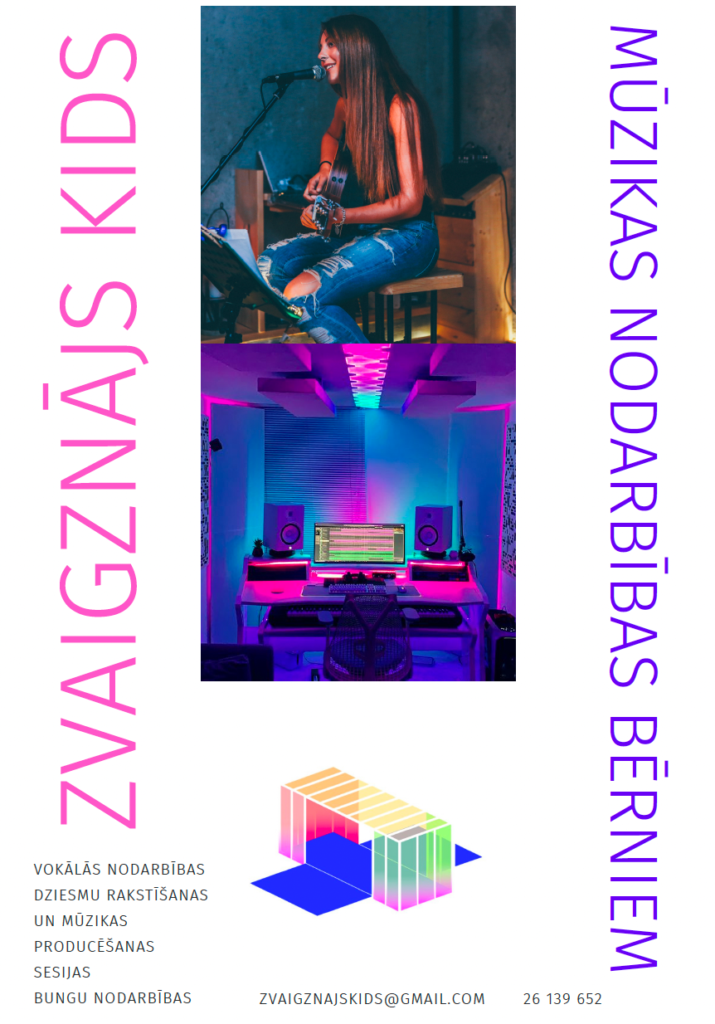
Give your child the chance to learn music!
The social enterprise "Star Constellation Team" offers group and individual lessons - vocal lessons, drum lessons, piano lessons and learning music production using Ableton, DJ school and songwriting!
❄️Find oute more: www.zvaigznajs.lv
📧
EDUCATIONAL GIFTS
BARBOLETA - balance platform for learning through movement

🎄Movement, joy of learning, efficiency.🎄
Warm, bright, family and FUN! Balance platforms are used as an innovative and effective tool for focusing attention, motivating, memorising information and boosting energy at work and in the learning process. Suitable for families with children from 1.5 years of age.
👉 Buy the Balance Platform and the user manual in the e-shop and help your child to concentrate better and learn with fun!
❄️Order here: www.barboleta.lv
📧
INTELLECT DEVELOPMENT CENTRE - classes to improve cognitive abilities

The Intelligence Development Centre offers scientifically proven solutions to improve cognitive abilities in both children and adults using the biofeedback method.
Depending on the age of the child or young person, we carry out cognitive ability tests and discussions with parents before the sessions in order to design a personalised training programme and promote the development of skills and abilities through a variety of tasks. During the sessions, around 15 different skills are promoted and new skills are developed. These are basic skills that will help the child to better master the subject or any type of new knowledge.
ACTIVITIES:
Fine and gross motor exercises;
Bilateral exercises;
Attention and concentration exercises;
Numeracy or literacy exercises;
Training of auditory and visual attention through games.
❄️Find out more: www.intelektacentrs.lv
📧
GIFTS FOR COMING TOGETHER
UPESLĪČI ATPŪTAI - "all included" offer
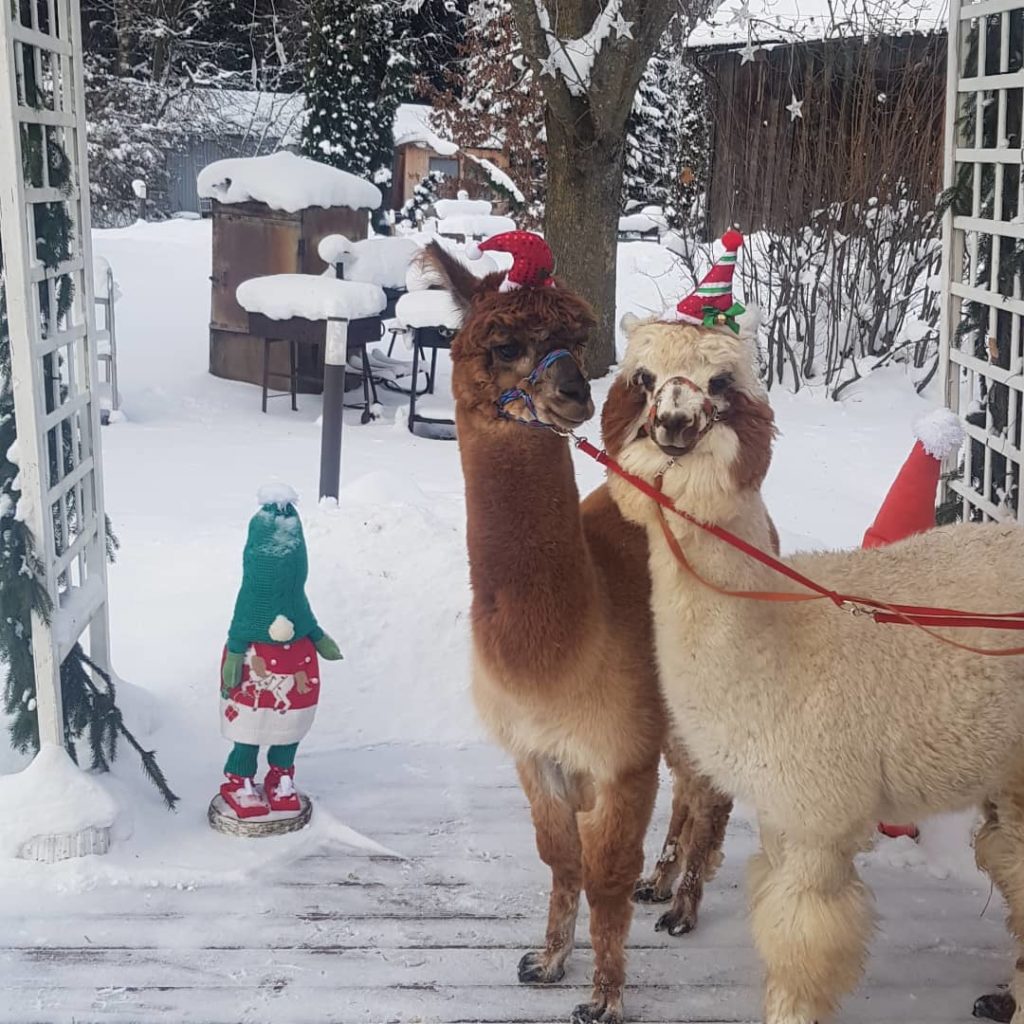
Looking for a great place for a family holiday?
Upeslīči offers an all-inclusive stay in a guest house, using the entire guest house and its spacious grounds as the only guest accommodation.
The offer includes:
🎁 Marinated meats and vegetables that you can cook yourself on the barbecue or a ready-made dinner,
🎁 We'll make a sauna for you and you can use our scrub,
🎁 We will also have a hot tub for you, where we will find the right essential oil for you to use in your hot tub ritual, and if you want to pamper your body, we will also add rose petals to the hot tub,
🎁 We offer quad biking, provided the weather is good and the track is passable,
🎁 In the morning we will have a special breakfast for you to enjoy on the veranda,
🎁 After breakfast we will introduce you to the alpacas, rabbits and sheep, so you can feed them and walk with the alpacas,
🎁 There will also be a small snack table throughout your stay, as well as a wide selection of teas and a coffee machine with specially roasted coffee.
❄️Find out more: www.upesliciatputai.lv
📧
📞 +371 28117861
SONIDO - give the gift of conversation!
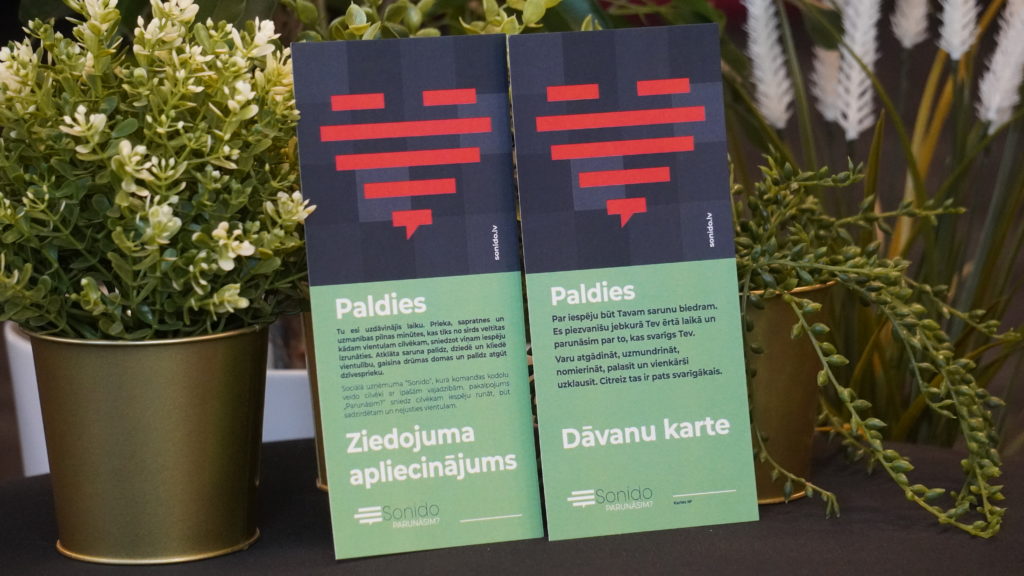
Give the gift of time! One way to greet partners and friends in a meaningful way is to donate to the "Let's Talk" project, giving the gift of conversation to someone who feels lonely. Callers are listened to by Sonido staff with disabilities, sparking open conversations that help, heal and dispel loneliness.
Give the gift of a companion! If you know someone who longs for a conversation every day, but for some reason doesn't want to call the Let's Talk line - we can call them ourselves. All you have to do is choose the time and topic that will make them feel most comfortable.
❄️Donate on Mobilly platform
You can order gift vouchers by writing to: 📧
ESI/ - time together with emotional intelligence game books
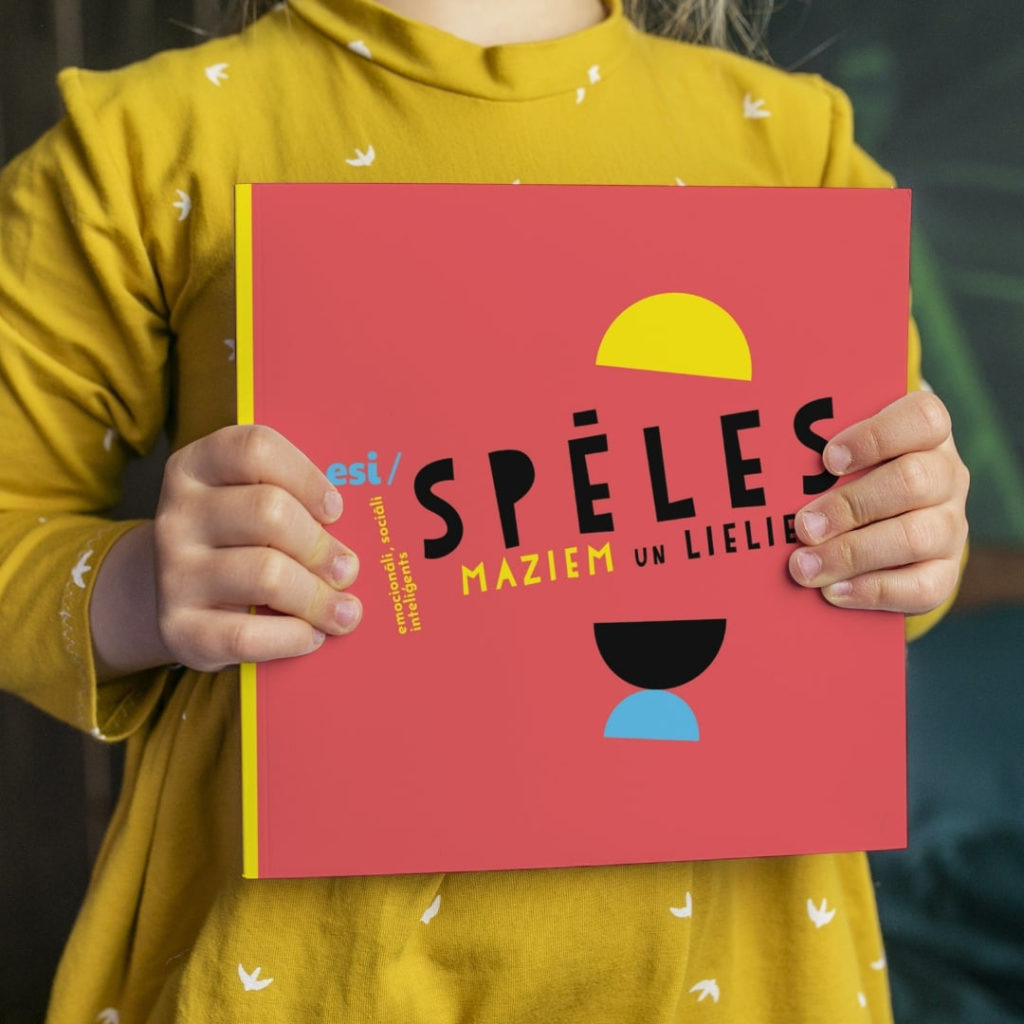
We invite you to give the most precious gift you have - TIME TOGETHER. For your child, yourself, family and friends, 45 games as methods collected in one great book "be / GAMES for young and old". May the dark evenings become full of laughter, emotions, good thoughts and deeds. Let the family be united, develop mindfulness, empathy, communication and determination. The book gently and freely develops emotional and social intelligence - self-awareness, compassion, the ability to listen to others, resolve conflicts and work as a team.
This year, other books have also been added to the shelves of the online shop:
🔔 esi/ PAŠREGULĀCIJA - get to know and guide yourself
🔔 esi/ emociju spēles - what to do with difficult emotions?
🔔 esi/ emotionally and socially intelligent
🔔 esi/ INSPIRATION
❄️Order here: www.esicentrs.lv
📧
ENVIRONMENTALLY FRIENDLY
GLASS POINT - bottle cutting kit
A great opportunity to surprise your friends and family with design solutions created by recycling glass bottles! The Glass Bottle Cutting Kit is ready to go. Glass Point Studio has all the technical equipment you need, as well as video tips, to make your glass vases, glasses, candle holders or lamps. The creative process will result in handmade Christmas gifts, interior solutions and surprises for friends.
❄️Find out more: 📧
0 DESIGN - recycled paper and furnishing

At 0 design, we believe that sustainable design is a story of simplicity and long-term comfort. However, you still have the freedom to choose excellent taste. You still have the freedom to choose for yourself. Buy design items made with care for the environment using recycled paper - send letters on tasteful recycled paper or brighten up your interior with lampshades!
❄️Find out more: www.0design.lv
DONATION AND VOLUNTEERING OPPORTUNITIES
HOSPISS LV - support for terminally ill patients
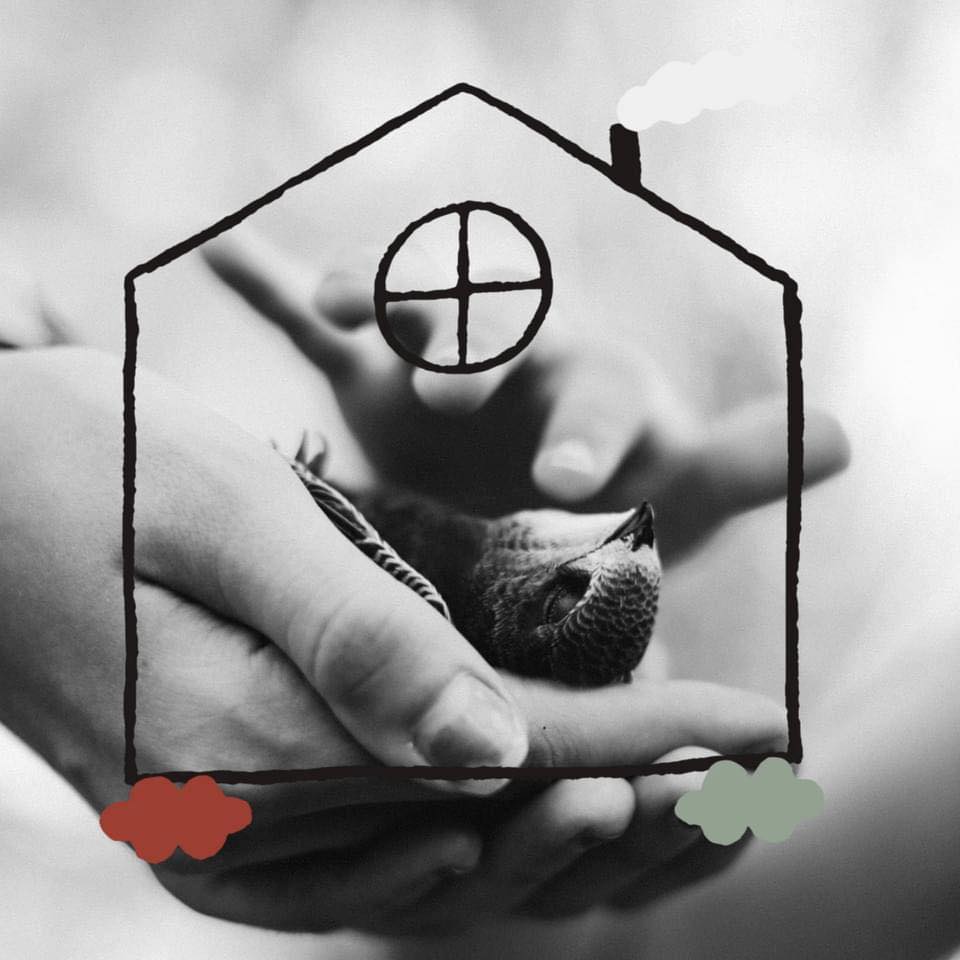
No one wants to plan for a serious, incurable illness. It happens suddenly and we rely on the system, on pre-death care. The reality is that you end up at home without proper care, hoping for help from your peers, if you have any.
There is a certain notion that we would all like to die at home. In our own bed. 🛏
But is it? In your own bed, without being able to crane your head, to see the window?
A special care bed with removable sides, wheels, a remote control and a special anti-sleep mattress is a REAL aid in the care of a sleeping patient, which unfortunately is not available to everyone.
We would like to collect donations for such beds and mattresses so that dying people can get them free of charge, without losing the Freedoms that remain at the end of life!
We can all do our part by standing up for the dream of living freely in Latvia!
❄️Find support opportunities here: www.hospiss.lv
Find out more Facebook
LATVIAN RED CROSS - Give a gift to children seeking asylum!

As every year, also at the end of 2022, the Society Integration Foundation, together with the Latvian Social Committee, the "I Want to Help Refugees" movement and the Asylum Seekers Accommodation Centre "Mucinieki" invite the people of Latvia to provide gifts for the children of 120 asylum seekers. To take part in the charity campaign, please call 29249232!
❄️Find support opportunities here: www.redcross.lv
NGO HOPE WINGS - help Ukraine!
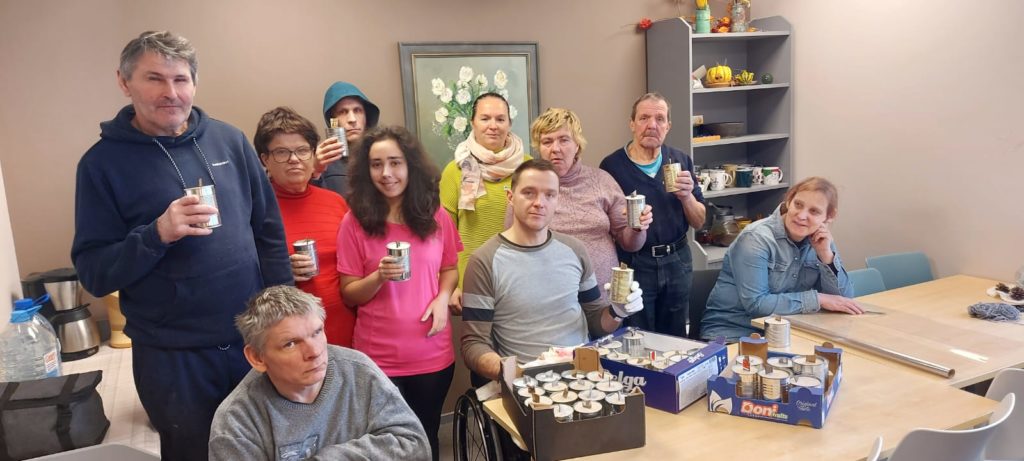
Ukraine needs our help!!! 💛💙
What we need now:
- Warm clothes, thermal underwear (only in good condition please);
- warm socks, gloves, hats and scarves;
- wet wipes, feminine hygiene products; wet wipes, feminine hygiene products; wet wipes, feminine hygiene products; wet wipes, feminine hygiene products. Mats, wet wipes, wet cloths, wet wipes;
- Pampers and baby food;
- saws, axes, generators;
- Nuts, energy bars, dry soups/juices, etc.
We invite those who are more comfortable to donate funds to the account LV38UNLA0050014911298, Society "Cerību Spārni", with the indication "Donation for Ukrainian people".
❄️Items can be dropped off on weekdays at Rīgas iela 1, from 8.00 to 17.00,
Institūta iela 5/a, charity shop "Visi Var", 9.00-18.00. On Saturdays from 9.00 - 15.00
Weekends at the group house, Kārkli, Siguldas parish
LATVIAN SAMARITAN COMMUNITY - age ≠ loneliness
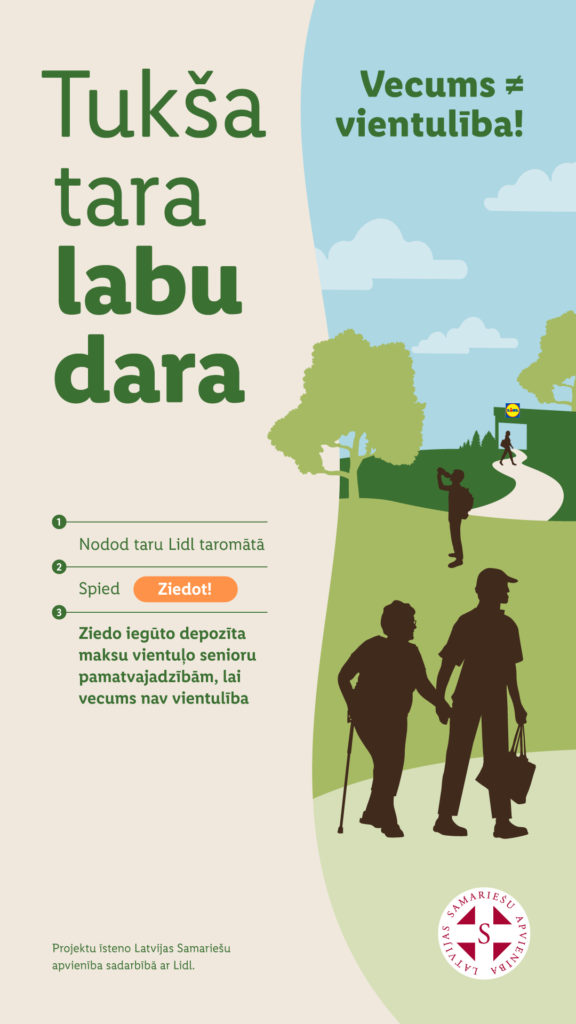
Since September 15, the Latvian Samaritan Association (LSA) in cooperation with the retailer Lidl Latvija has created and introduced a new experience in Latvia - the possibility to make a donation in a taromat, redirecting the amount of the deposited packaging to charity. The first project to offer such a donation option is the project "Old Age is not Loneliness" to support lonely seniors. In a month and a half, people have already donated just over €1 300, which means that 13 000 bottles have been donated to charity. Join the campaign!
❄️Find support opportunities here: www.samariesi.lv
NGO "TUVU" - gifts for lonely seniors
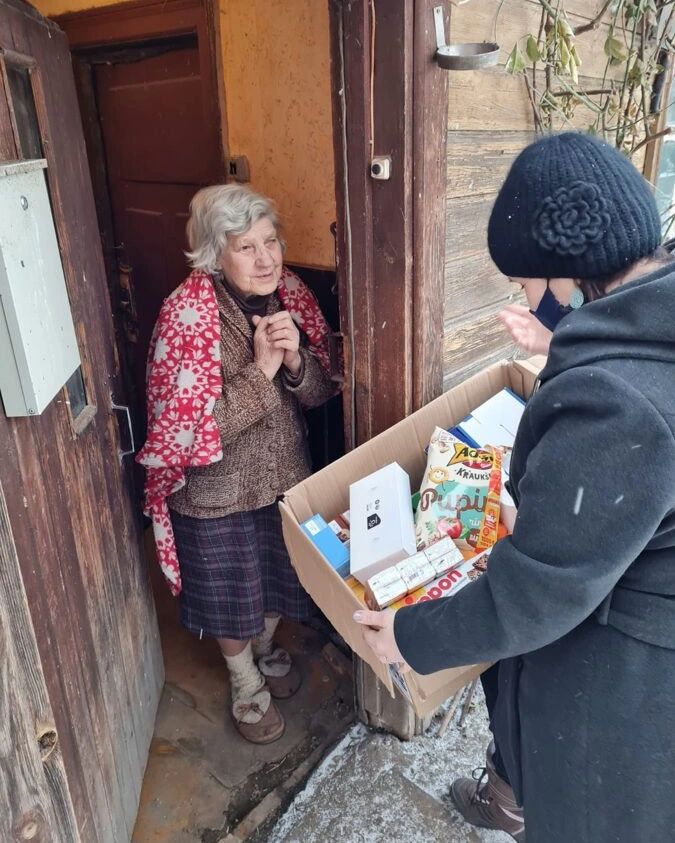
This year is no exception - we will be creating Christmas boxes of treats and gifts for families in need. You too have the opportunity to contribute with your donation!
By donating:
🌲Candy;
🌲 food;
🌲 toys;
🌲 daily necessities.
❄️Donations can be delivered to:
Jelgava, Pasta Street 51, or Brankas, Saules Street 2b (call 26319985 in advance)
CAT CARE COMMUNITY - help cats find homes!
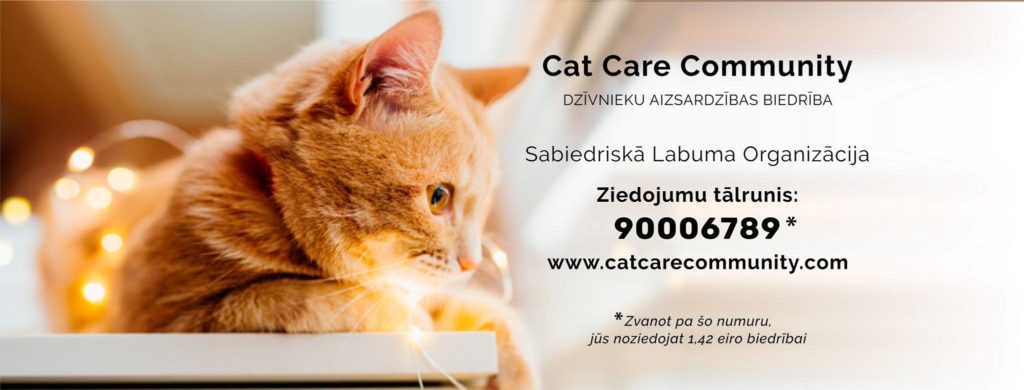
The association helps homeless cats find permanent homes. It provides temporary homes or clinic treatment and is actively looking for new owners. You can help by calling the donation line or buying animal-themed clothing, with all profits going to the social cause: www.pukainis.store.
❄️Find support opportunities here: www.catcarecommunity.com
Find out more: Facebook
LABDARĪBAS FONDS SOFI - palīdzi īstenot labdarības projektus!
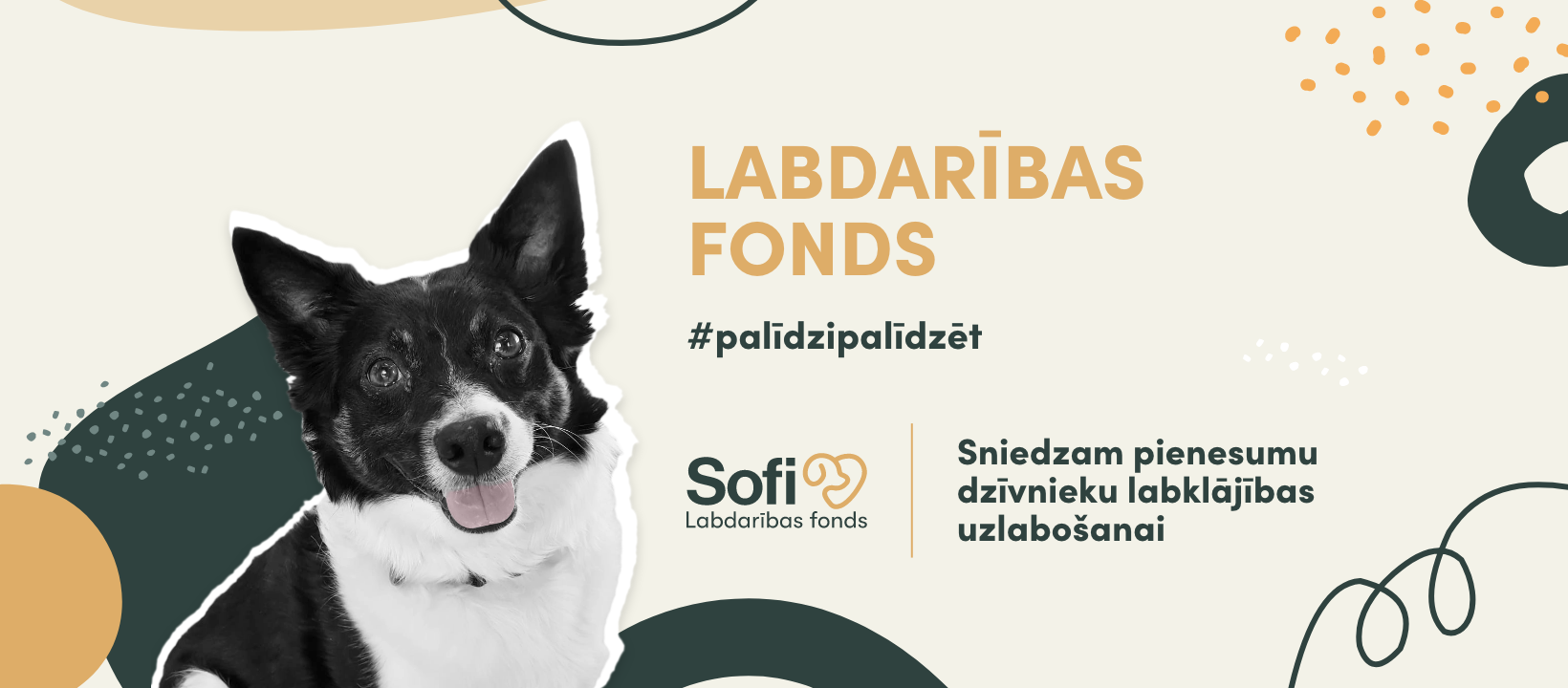 The Sofi Charitable Foundation was established in 2020 and contributes to improving the well-being of wider society.
The Sofi Charitable Foundation was established in 2020 and contributes to improving the well-being of wider society.
The Foundation supports animal shelters and promotes animal welfare, implements projects to improve children's health and education, supports socially disadvantaged groups and contributes to environmental clean-up, improving conditions for both people and animals.
❄️Find support opportunities here: www.sofifonds.lv
Find out more: Facebook
Social Entrepreneurs for Tourism
The field of social entrepreneurship is on the rise, drawing more supporters and venturing into diverse sectors. To keep the trend up, addressing challenges posed by COVID-19 with innovative solutions had become essential. One such strategy involves social enterprises not only sticking to their core business but also reshaping and adapting their offerings to cater to the tourism industry. This dual-purpose approach aims to not only generate additional income but also ensure the sustainability of these enterprises in the face of evolving circumstances.
The Latvian Social Entrepreneurship Association, in cooperation with the Georgian Social Enterprise Alliance (SEA) and the Regional Sustainable Development Institute (RSDI) of Georgia, had been exploring opportunities to promote the possibility of social entrepreneurs engaging in the tourism industry under the project “Social Entrepreneurs for Tourism” funded by the Ministry of Foreign Affairs of the Republic of Latvia.
Social entrepreneurs face several challenges when stepping into the tourism sector. The lack of information on current tourism trends, along with the need for innovative service development and entrepreneurial skills, makes it difficult for them to integrate successfully. The Covid-19 crisis hit the tourism industry hard, prompting shifts in habits and industry dynamics. Travelers now lean towards exploring local destinations, engaging in traditional events, and supporting small businesses. To ensure a sustainable and engaging tourism experience that positively impacts communities, successful collaboration is crucial. This collaboration should involve various stakeholders, including public and private organizations, local producers, social entrepreneurs, cultural sectors, local authorities, and tourism management organizations. By fostering cooperation among these parties, we can, and indeed did, craft a tourism offer that aligns with evolving preferences and creates a positive social footprint in the visited communities.

The project successfully unfolded from July 1, 2022, to November 15, 2022, with the overarching goal of nurturing the social business ecosystem and fostering a positive social impact in Georgia. During its implementation, small and medium-sized social enterprises were empowered to adapt their services to thrive in the tourism industry. The key achievements include:
- Identification of social enterprises adept at providing services in the tourism sector.
- Enhancement of capabilities, knowledge, and skills for social enterprises, NGOs, and civil society organizations, enabling them to deliver high-quality tourism services and collaborate effectively with tourism agencies.
- Support provided to tourism sector representatives and fellow social entrepreneurs in overcoming the consequences of the COVID-19 pandemic through innovative approaches.
- Creation of opportunities for cooperation, meetings, and networking among social entrepreneurs, promoting the exchange of experiences and knowledge.
Within the framework of the project, social entrepreneurs capable of providing services in the tourism industry were identified. They became acquainted with existing and potential social business initiatives in the field of tourism, including those already offering various activities and those with the potential to be involved in this field. The capacity of social entrepreneurs was strengthened, with efforts directed towards improving their knowledge and skills to develop activities in the tourism sector. Experience exchange and individual mentoring were provided to aid in the development and enhancement of products/services.
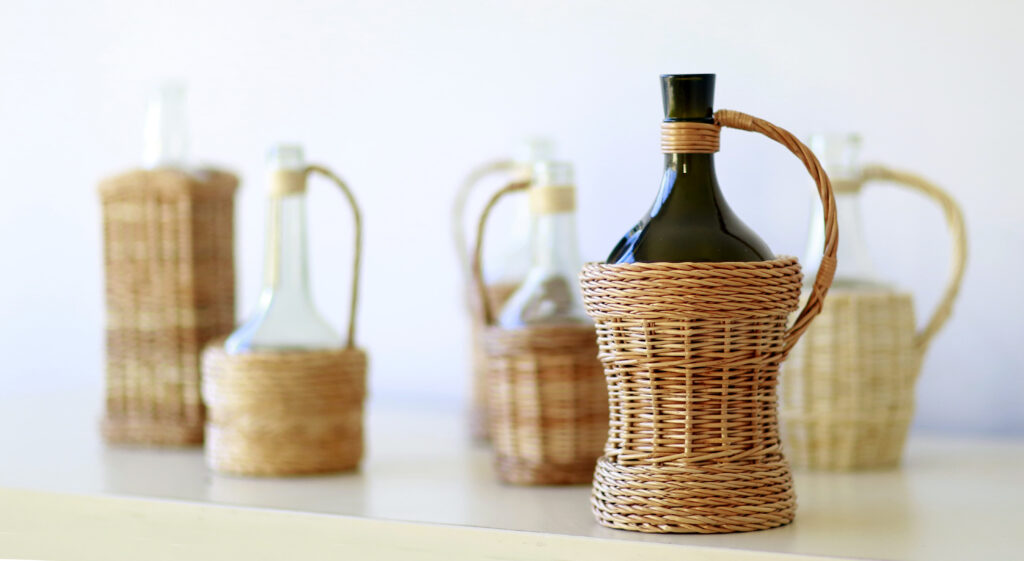
During the project, we developed and tested tourist routes in different regions of Georgia, which underwent multiple improvements and refinements. These routes involve the social enterprises that we have been working with along the way and offer an experience that brings a positive impact. To explore more about routes alongside detailed offers from social enterprises check out our article or download the Touristic Catalog of Social Enterprises.
The project extended to the exploration of the relationship between social tourism and social entrepreneurship in Latvia. While the concept of social tourism has been widely discussed since 2014, its actual presence still has significant room for growth. In Latvia, social enterprises have embraced the concept in their business practices, which is not surprising given the close alignment of core values between social tourism and social entrepreneurship. If you’re interested in further details, the article on Social Tourism Development in Latvia provides insights into the recovery efforts amidst the COVID-19 crisis. This article sheds light on how these intertwined concepts have played a role in navigating the challenges posed by the pandemic and fostering resilience in the community.
The entire journey facilitated the sharing of experiences, networking, and learning from successful examples. The project produced tangible resources, including a touristic catalog, and laid the groundwork for participant enterprises to sustain their development in the social tourism sector. As a result, these efforts have collectively contributed to the growth and advancement of social entrepreneurship in Georgia’s tourism industry.
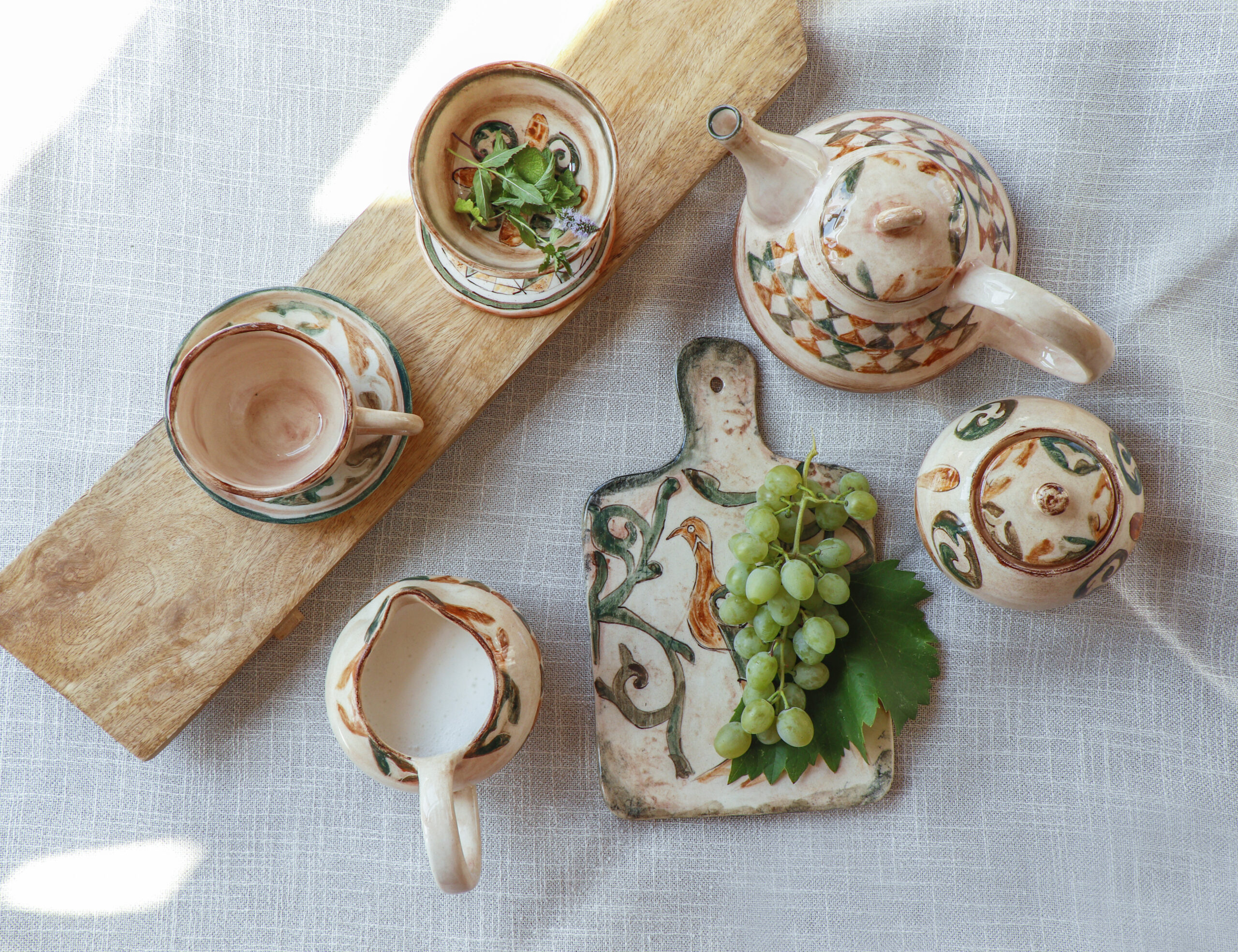
This piece was written in the framework of the project “Social Entrepreneurs for Tourism”, funded by the Ministry of Foreign Affairs of the Republic of Latvia.

Report on trends and challenges for work integration social enterprises in Europe
The B-WISE project partners are pleased to announce the publication of the "Report on Trends and Challenges for Inclusive Social Enterprises (WISEs) in Europe - The state of play on skills shortages, in particular in the digital field", prepared by EURICSE with the support of the other project partners.
The report aims to contribute to the development of a strategic approach (Blueprint) for sectoral cooperation on skills to strengthen the work of WISEs and the skills of their workers, as well as to sustainably address the digitalisation challenges they face. Based on 27 country reports, face-to-face interviews and an online survey carried out in 13 B-WISE partner countries, the report analyses the main drivers, features and trends of WISEs in the EU-27 and explores the skills needs and gaps of WISE workers, in particular with regard to digital skills.
The report maps the EU's WISE sector and highlights the challenges these organisations face in supporting their employees from socially disadvantaged groups. The first chapter of the report analysed labour market constraints and the shortcomings of labour policy measures implemented to support the integration of workers from socially disadvantaged groups into the workplace. The following chapters look at the main features of WISEs, their added value, their drivers and their development models. Chapter 2 analyses the integration models and economic activities of WISEs; Chapter 3 focuses on reflecting the diversity of WISE legal structures in the EU-27; Chapter 4 outlines the range of resources available to WISEs: Chapter 5 aims to illustrate the context of WISE emergence and development patterns in three country groups; Chapter 6 explores the technical and interdisciplinary skills (soft skills) of WISE staff (managers, support persons and staff from socially disadvantaged groups) and related skills gaps; Chapter 7 assesses the state of WISE technology, digitisation and digital skills in the 13 countries participating in the B-WISE project. Finally, Chapter Eight highlights recent trends and challenges facing WISE in the countries studied.
This report is used to inform the future work of the project. The project partners are currently focusing on analysing the skills needs of all WISE workers, in order to be able to draw up specific training programmes for each of them and, finally, to develop a sectoral skills strategy!
Read the report HERE.
The B-WISE project, Blueprint for Sectoral Cooperation on Skills in Work Integration Social Enterprises, is an Erasmus + project coordinated by EASPD with the support of ENSIE.
Social Tourism Development in Latvia
Social tourism is inclusive for different groups of people and accessible to everyone. Since 2014, the discussions on the concept of social tourism have started and there were several attempts to introduce it in Latvia. Social entrepreneurs seem to be the most suitable to implement the concept of social tourism, however social entrepreneurship in the tourism and hospitality sector has only recently emerged.
Social entrepreneurship is a type of business where the main objective is not to make a profit for business owners, but to solve a social problem or to create a benefit for society and to reduce the negative impact on the environment and disadvantaged communities. Social entrepreneurship is also increasingly developing in the regions of Latvia, and tourism is an area that has great potential for financial diversification of organisations, which is often one of the biggest challenges for businesses in the regions.
Tourism trends after Covid-19
The tourism industry is based on directing the flow of travellers and regulating their presence in specific places – tourist destinations. Tourism products are very diverse, both services and goods – they are unlimited in time and space. Business thrives where opportunities and an enabling environment are created. COVID 19 pandemic has had a major impact on the tourism industry and has changed the habits of tourists. Local tourism has been boosted, tourism services are becoming more specific and varied, and businesses are diversifying their products. This summer’s campaign “Visit Latvia’s Castles and Manors 2022” that was organised by the Latvian Association of Castles and Manors in cooperation with LIAA, shows that at the moment the most frequent travellers are families, couples and small groups of friends. International tourism has seen a decline in the share of group trips and in the markets generating tourists. In general, an increase of interest has been observed in nature tourism, individual experiences, including catering in non-traditional settings such as ‘Home Café Days’ or dinner on the lake. More and more people are thinking about health and health prevention measures. There is also a demand for masterclasses offering activities related to art, gastronomy, sports, spending time with loved ones and pets. There are many successful examples of animal therapy, allowing people to interact with trained dogs, horses and other pets.
Latvian social enterprises in tourism
Armands Muižnieks, a professional guide, lecturer at Turiba University and RSU, says that in one of the international conferences it was mentioned that the traveler society is changing from an information society to a dreamer society. Travelers are fascinated by sensations and adventures and less interested in information that is available to everyone. Latvian social enterprises such as “Emociju laboratorija” and “Glass Point ” offer previously mentioned masterclasses in the arts. The social enterprise “Brīvupes” in the municipality of Balvi offers animal therapy – canister therapy with dogs. The social enterprise “Nature horses” in Ķekava municipality offers experience with horses and promotes their welfare. This is also a time of opportunity for entrepreneurs from small tourist destinations in the regions, towns and countryside to create an offer that may not be their main source of income, but that can help to diversify and stabilize their income. Sometimes ideas are born by chance, adapting observations or examples seen on trips abroad. This year, a new social enterprise, “Kultūras tūrisms”, has started their activity, Indulis Bērziņš, the founder says:
“What I do is nothing new. The first Glemping came about a long time ago, when rich people brought luxury tents to sleep in the middle of nowhere in the desert. However, our niche is to be able to stay in places in Latvia where it hasn’t been possible before, and to be at the heart of great cultural places and people who are already successfully welcoming guests, just without overnight accommodation. This is a new offer in Latvia and possibly in the world.”
Current tourism trends also mean a distinctive tourism product targeted at a specific market segment – one that is not a mass tourism product. There is therefore great potential for tailor-made tourism services, such as a floating raft in a Finnish lake with facilities for wheelchair users to fish through holes drilled in the floor – just like ice fishing, with safety precautions. Muižnieks also mentions the example of how he and a wheelchair-using student from SIVA College thought about creating high beds for growing vegetables and spices so that wheelchair users could sow, plant, weed and harvest their own crops. Another successful Latvian example is the social enterprise “Visi var” in Sigulda, which both produces its own design and household goods, involving people with disabilities, and also sells the goods it produces. These include various themed candles, crockery, clothing and accessories, and could certainly be souvenirs of various tourist destinations if production is expanded.

Accessibility
Accessible environment in general is of great importance – for example, in Liepāja, a blind guide Artūrs Līvmanis offers guided tours. As he says in an interview, “Liepaja has a good system of traffic lights and sound, as well as a public transport loudspeaker that announces the number and destination of the bus at each stop, so you can hear it outside.” Accessibility and universal design are issues that should be on the agenda of every tourism service. For tourism to thrive, there must be tourist attractions (man-made or natural), accessible environment (including easy-to-use transport systems) and adequate tourism infrastructure. This is an issue for many tourism destinations in different regions of Latvia and needs to be addressed. Once this is sorted out, operators will find ways to provide services. For example, the social enterprise “Difftravel” is already exploring accessibility and offering tours for people with mobility, visual or hearing impairments to appropriate locations in the Baltic States and plans to develop further destinations for trips abroad.
Social entrepreneurs have a much better understanding of social issues and where to develop tourism and hospitality services for different groups in society. For example, the social enterprise “Neredzmā pasaule” offers guided tours in the dark led by blind guides. Such specific services are one way of promoting public awareness and integration of people with disabilities. The most important aspect of such offers is that the service must comply with the principles of social entrepreneurship. The service must be safe, of good quality and accessible; it cannot be only a marketing slogan. Often entrepreneurs get carried away with the idea and forget that the interests of the client are the most important aspect of successfully selling the service. Competition in the tourism industry is high, so the quality of the service is important. The recipient of a service will not choose a service or product just because it is offered by a social enterprise. At the same time, it is important to explain to the general public why the results and impact of the work of social entrepreneurs is important, and sometimes the prices of the service may be higher – it is not profit for the owner, it has a higher added value.
Muižnieks also points out that on average it takes three years for a company to conquer a market and feel stable. It takes time and human resources to prepare and prioritise a tourism product, find partners, find sales channels, attract customers through social media, etc. Once a clear offer has been defined, it is necessary to involve sector or industry associations to find partners who can advise on marketing activities or implementation. In the tourism and hospitality sectors, cooperation plays an important role. In the tourism sector, help is available at national level from the LIAA Tourism Department, regional tourism associations, tourist information offices and centres, professional associations and business incubators.
This article was written in the framework of the project “Social Entrepreneurs for Tourism”, funded by the Ministry of Foreign Affairs of the Republic of Latvia.

Successful Partnerships between Municipalities and Community Based Organisations
The municipality and local grassroots organisations in the long run share the same goal – to improve the life quality and satisfaction of the residents and create new opportunities in various fields of activity. Therefore, it seems only natural to be open to cooperation and work together to achieve the same goal creating synergies and value for both sides. It is even more essential when social issues are becoming more complex and need to be solved in a systematic way. The lack of cooperation with non-governmental organisations and social enterprises implies difficulties in addressing existing social issues. It is particularly difficult to reach the target audiences best placed to explain the existing difficulties and suggest the most effective ways of resolving them.
Five pilot municipalities from different European countries were selected to explore the challenges, needs and opportunities for successful cooperation between municipalities and community-based organisations, youth organisations and social enterprises. The project partners chose Talsi Municipality in Latvia, SE-FORUM in Sweden works with Dalarna Region, Portuguese youth organisation CXJV Conexão Jovem Associação works with Braga Municipality, Centre for Research & Education ‘Synthesis’ in Cyprus tests the project approach in Aglandia Municipality, while the Lithuanian partners Geri Norai have chosen the Municipality of Trakai.
The work with pilot municipalities resulted in the creation of:
- database of active organisations in five European municipalities,
- report “What are the needs and challenges to develop successful partnerships between municipalities and community-based organisations?”
- examples of cooperation, and
- main conclusions on the mapping process.
DATABASE OF ACTIVE ORGANISATIONS
The database that gathers various profiles of community-based organisations and social enterprises in five European municipalities, provides an opportunity to get to know active organisations and to develop joint collaborations and initiatives not only between the municipalities in which they operate, but also internationally.
Click on the database from each country to get to know local organisations.
WHAT ARE THE NEEDS AND CHALLENGES OF BUILDING A COOPERATION?
This report tackles the needs and challenges of building a cooperation between the municipalities and community based organisations that work with youth or with the aim to improve the lives of youngsters.
Even though the countries represent different regions, cultures, backgrounds and regulations, the main needs identified are quite similar. The needs and challenges were identified by individual communication with both sides – through surveys and interviews with the local organisation representatives and municipality workers, as well as locally held events.
Analysing the main problem which is that cooperation between municipalities and community based organisations is ineffective, four main causes have been identified, therefore, this report seeks to combine the needs and challenges in certain categories:
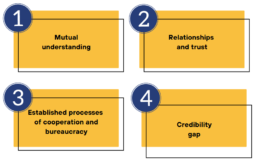
COOPERATION EXAMPLES
See different best practice examples of successful cooperation in five pilot municipalities!
Click on each country to read all the examples.
MAIN CONCLUSIONS
The collection and analysis of information is the cornerstone of every activity the organisation is planning to undertake. It gives the data and information to create meaningful events that respond to the needs of the stakeholders. Mapping of needs analyses the actual collaboration models, defines cooperation gaps and identifies challenges. The overview of diverse partner countries shows a great variety of cooperation models, different approaches allowing partners to learn from each other.
Follow the main steps to organise the process of mapping of needs successfully:
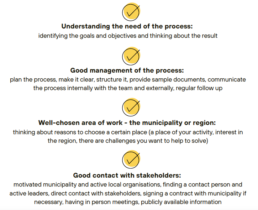
The above mentioned outputs were created in the context of the project “Enhancing youth capacity in municipalities and encouraging mutual cooperation using social entrepreneurship as a tool, LOCAL-Y-MPACT” The objective of the project “LOCAL-Y-MPACT” is to strengthen the cooperation between community based youth organisations and social enterprises and local municipalities, and promoting social entrepreneurship as an effective tool for reducing economic inequality, promoting social inclusion and integration, creating resilient society and fostering active participation within local communities.


Needs & Challenges available in:
Greek
Latvian
Lithuanian
Portuguese
Swedish
Main Conclusions available in:
Greek
Latvian
Lithuanian
Portuguese
Swedish
Social Entrepreneurship pitch contest “Let the good ideas grow 2022”
Social Entrepreneurship Association of Latvia in cooperation with Luminor bank organise the Social Entrepreneurship pitch or presentation competition ” Let the good ideas grow ” for the second year. The aim of the competition is to promote the development of existing social enterprises and new social entrepreneurship ideas, as well as to share the ideas across Latvia.
The competition is organised in three rounds, with two social entrepreneurs or authors of social entrepreneurship ideas each receiving a cash prize of €2000 to develop their business or idea. The winners are determined by a jury and a live vote of the audience.
This year 50 applications from all over Latvia were received for the contest. 25 strongest ideas and projects were shortlisted for the second round, after which the experts took part in pitch training sessions to identify the 10 finalists.
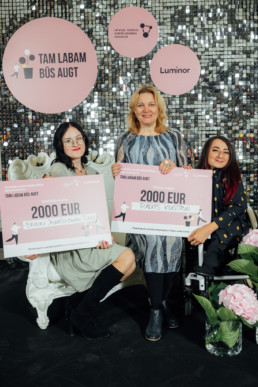
The main awards – cash prizes of 2000 euros for the growth of the business received project “Created for Movement” submitted by the association “Gaismas laiva” from Sigulda district and the Youth centre TUVU in Brankas, Jelgava district.
The project “Created for Movement” was announced as winner according to the jury decision. The project offers functional clothing and accessories for children with reduced mobility.
The winner of the live audience vote was the Youth centre TUVU in Brankas, with the idea to create a “Coffee Shop” in Ozolnieki – a container-type café where young people can get their first official work experience and facilitate their entry into the labour market.
The competition received a lot of publicity this year – between 1st of August and 14th of September, 76 media publications and 23 Facebook posts with a total reach of 91066 were published. The live broadcast of the contest final was streamed on the most popular news portal in Latvia – Delfi.lv and Facebook and it was watched by 19052 (unique viewers). Unique votes of the live stream viewers: 1182.

Social entrepreneurship development program Impact Academy
The “Impact Academy” social entrepreneurship development program has ended. It has helped Latvian social entrepreneurs to better understand the further development path of the business, as well as expanded the community.
At the end of last week, the participants of the program came together to present the development plans developed as part of the training.
The free social entrepreneurship development program “Impact Academy” was organized by the Social Entrepreneurship Association of Latvia in cooperation with “Luminor” bank. It was intended for companies, associations and authors of business ideas who are already active in social entrepreneurship and want to take a step further in the development of their organization or idea. The purpose of the development program is to promote the development of already existing social business ideas, strengthening their capacity and promoting the development of new directions and products.
“There are many programs that work with new ideas, but it is also necessary to strengthen those social enterprises that have already stabilized, but which need to be helped to take the next step,”
emphasizes Regita Zeiļa, director of the Social Entrepreneurship Association of Latvia.
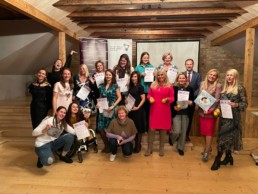
The participants of the “Impact Academy” were given the opportunity to participate in six-month training, where experts from various fields provided practical knowledge and in individual consultations helped to develop idea development plans, as well as to start their implementation. According to the profile of his business idea, each participant was also assigned a mentor – a social entrepreneur or a specialist in a certain field, who provided advice based on experience and who could be consulted individually throughout the program.
At the closing event of the program, each of the participants highlighted the benefits of this program and further growth plans.
SIA “Print Art” offers posture correcting T-shirts under the brand name “Correcty”. The representative of the company, Yekaterina Romanova, did not hide that before joining the program, there was a period in business development when both she and the other owner of the company, Nataliya Yermolayeva, lacked motivation, the business had essentially stopped, and there were also considerations as to whether or not to continue what had been started. The program has made it clear that you still need to speed up, and the idea of a new product for knee support during running has also arisen. The company will also start the production of posture-correcting T-shirts for young people.
SIA “doopsis” produces and sells reusable cloth diapers that are friendly to the environment and the child’s health, and the problem it solves is the amount of waste. The founder of the company, Linda Dambeniece-Migliniece, said that her goal when joining the Academy of Changes was primarily to create a community with a support system for new parents who want to use cloth diapers. At the end of the program, she highlights the opportunity to be with other social entrepreneurs and hear stories of their experiences. “Every time I went home very inspired,” she said, adding that consultations with experts were also very valuable, which made me think not only about the current situation, but also about the further development of the business.
“What has changed? A specific action plan has been created. I know what I will do to build a community. And I have already started doing it. In terms of business, we have almost started producing ourselves – when I started participating in the “Impact Academy”, I was a sewing outsourcer. And now I have more courage to try something new,”
emphasized the entrepreneur.”
The owner of SIA “Engineering for children”, Kristīna Jacino, has a PhD in food engineering and the company educates children about the production and nutritional value of food products. She emphasized gaining new contacts as a significant benefit from the “Impact Academy”. Also, the idea of master classes for children, where they will also learn about how the price of a product is formed, has arisen.
Renāte Bērante started in the “Impact Academy” with a business idea for “Monte’s Stories” – a fairy tale book for children, which answers various questions instead of parents in an entertaining way and at the same time encourages children to turn to literature, instead of looking for answers on Internet resources. The dream of the future is to create a place of entertainment and culture for children not only from families who are able to pay, but also for those who cannot afford it for some reason.
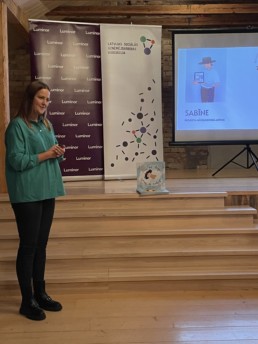
“My initial goal when entering the “Impact Academy” was to understand whether I am a classic entrepreneur or listed as a social enterprise,”
said Bērante, emphasizing that she wants to do good work and earn money at the same time. Ultimately, it was decided to establish a social enterprise. During the program, she got to know other social entrepreneurs, which creates a sense of belonging to this community. “Within half a year, I have gotten myself a kind of route map, where I will go, how I will do it, in what status I will be and how I will get there. And that is the most important thing,” she said. In 2022, significant awards were received in children’s literature – Jānis Baltvilks “Youth” award for a debut in children’s literature and book art, as well as the Jānis Baltvilks Readers’ Sympathy Award. It gave significant recognition. “During this half year, I have finally found cooperation partners who will help develop the puppet theater, it will be movable, foldable, put in the trunk of a car, and we will be able to visit children all over Latvia – to kindergartens, schools, private parties,” revealed the entrepreneur. The second book is also being prepared.
The following participants also participated in the “Impact Academy” program: “Gaismas Laiva” association with the “Created for Movement” project, within the framework of which clothes are produced for people with mobility impairments; SIA “ĒT Resursu Centrs”, which provides mental health services – specialist assistance, consultations for persons suffering from eating disorders; SIA “Dzīvības poga” with a remote warning system – a service that ensures communication with loved ones in unexpected situations when medical or other assistance is needed; SIA “Children and Adolescent Resource Center”, which provides support for adolescents with various mental health risks and difficulties; SIA “Sculpture Culture” – the blind Georgs together with his mother Aivija Bārda offers modular houses with universal design elements, so that people with various types of disabilities can live comfortably and independently in them; SIA “Mana privātstunda” – a base of instructors for face-to-face and remote private lessons and an environment where you can learn online knowledge and skills to do homework and prepare for exams; SIA “Telpa bērnam” – an inclusive preschool educational institution with a specially adapted environment for children with autism and other mental development disorders; Ilze Zaharane’s practice as an audiologist; SIA “4 vēji”, which enables persons with mental health or other types of disabilities to work within their abilities; SIA “TIME TR LV” – employment of the socially excluded, former prisoners and people with disabilities; “Trunk market “Kirpēni”” charity project of “Dace” support society for the poor; labor integration company “Fregate”; SIA “Palliative care”, which includes physical, social, psychological and spiritual care; SIA “Stikla māja” – glass workshop “Glass Point” creates works of art, design objects and other products from recycled glass, and also offers the possibility to rent technical equipment for creating your own works of art; SIA “0 Design”, which produces interior items.
Social Impact Management of Youth Organisations and Social Enterprises
Social impact is becoming more important subject for both social enterprises and youth organisations. Often youth organisations lack knowledge and understanding about the actual quality of their work, if what they do really reaches their goals and how they could improve their work in order to create the impact they want.
In all Baltic states there is very little information available for youth organisations about the importance of social impact management, let alone user-friendly tools or consultation services. National youth policies rarely mention or tackle this topic, leaving it all up to organisations, social enterprises and youth workers themselves to figure out if and how they could track, evaluate and communicate their impact. The problem with poor social impact management among youth organisations creates challenges and tensions also on a larger policy level.
Five partner organisations from Baltic states – Social Entrepreneurship Association of Latvia, The National Youth Council of Latvia, Stories for Impact, The Estonian National Youth Council and Geri Norai, active in youth field as well as in social entrepreneurship shared their knowledge and experience about social impact management in youth organisations and youth social enterprises in the framework of the project BALTIC : YOUTH : IMPACT that was co-funded by the Erasmus+ Programme of the European Union. The project concluded in May 2022.
The main objectives of the project were:
1. to improve the capacity, skills and know-how of youth workers in youth organisations in Baltic States on topics related to social impact management (impact tracking, measurement, evaluation and communication), and
2. to promote the importance and approaches of social impact management in youth organisations among policy makers and stakeholders in Baltic countries by creating practical, user-friendly impact management tools and policy recommendations and implementing non-formal education learning and experience sharing events for youth organisations.
The outputs of the project
NEEDS ASSESSMENT AND OVERVIEW OF THE BEST PRACTICES
This paper provides an overview of whether and how youth organisations and social enterprises in the three Baltic States — Estonia, Latvia, and Lithuania — measure their impact and presents different examples to give other organisations tips for measuring their organisation’s impact. The aim is to establish the experience for today and determine the aspects motivating organisations to assess their impact.
Download in Latvian, in Lithuanian, in Estonian.
BEST PRACTICE STORIES
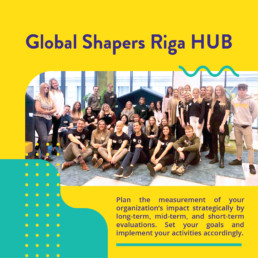
Social impact management best practice stories bring together a variety of practical examples of how youth organisations and social enterprises in the Baltic States measure, collect and communicate their social impact. These examples serve as a great source of inspiration for organisations that want to start their own social impact management but do not know how to do it.
Watch nine best practice stories in video format.
SOCIAL IMPACT MANAGEMENT TOOLBOX
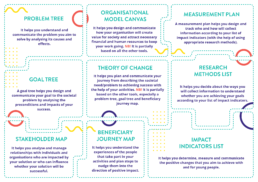
This toolbox can help you plan, implement and communicate the positive changes that you aim to create with your initiative or organisation in the lives of young people. Toolbox is a combination of nine tools especially developed for planning, measuring and increasing positive impacts of the organisations and reducing any negative effects of their activities. It is designed for an organisation that works with and for the young people, however, the tools are absolutely suitable for designing and measuring the impact of any activities.
Download the complete toolbox in Latvian, in Lithuanian, in Estonian.
GUIDELINES FOR SOCIAL IMPACT COMMUNICATION
These guidelines provide support instruments to help employees or volunteers in youth organisations or social enterprises to communicate their social impact in an understandable, inexpensive way, thus supporting efforts towards quality and better work of youth organisations. The goal of social impact communication is to increase and scale the positive social and environmental impact.
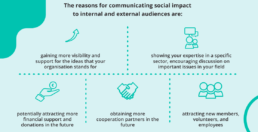
POLICY RECOMMENDATIONS FOR SOCIAL IMPACT MANAGEMENT
This paper outlines project partner recommendations, based on findings, external research, and expert opinions performed during the project. These recommendations are presented with the intention of informing policy-makers and lobbyists with the power to advocate for improvements in the area of social impact management in the youth sector.


